Overview
- Brief Narrative
- German postage stamp for 5 mark acquired by Ross Baker in prewar Vienna, Austria. It is an example of the hyperinflation of the Weimar Republic of Germany from about 1915-1924. Ross was a chemist and professor at the City University of New York. In 1937, he received a sabbatical leave to study at the University of Vienna and moved there with his wife and five sons. During this time, the family witnessed many historic events, such as the Anschluss and its aftermath in Vienna, visits by Hitler and other German officials, and the defacement and boycotting of Jewish businesses. On March 12, 1938, German troops marched into Vienna and, the next day, Austria was incorporated into Nazi Germany. The German enacted anti-Jewish laws immediately. On April 10, there was a popular vote on the merger and 99% of the population voted Yes in support of Hitler as Fuhrer. Jews were among those who had already been stripped of their rights as citizens, including the right to vote.
- Date
-
received:
1937-1938
- Geography
-
received:
Vienna (Austria)
issue: Germany
- Credit Line
- United States Holocaust Memorial Museum Collection, Gift of Stanley A. Baker
- Contributor
-
Subject:
Ross A. Baker
- Biography
-
Ross Allen Baker (1886-1978) was born in Greencastle, Indiana, to Philip and Luemma Baker (née Allen). Ross received a BA in chemistry in 1906 from DePauw University and a PhD in 1914 from the University of Wisconsin. He married Helen Fredericka Porter (1889-1964) on December 30, 1914. The couple had five sons: Philip Schaffner (1916-1986), Porter (1918-1987), Frederick Ross (1920-?), Stanley Allen (1921-?), and Raymond Davis (1921-1958). Ross held various teaching positions at universities throughout the United States and England. He was a national counselor in chemistry for the Boy Scouts of America, and helped write the merit badge booklet. During World War I (1914-1918), Ross served in the Chemical Warfare Service, specializing in the use of mustard gas. He later became active in efforts to have nations ban the use of biological and chemical weapons in the League of Nations, and later in the United Nations. In 1928, he was a US delegate for an International Union of Chemistry meeting at the League of Nations, and in 1938, he was a US delegate to the International Congress of Chemistry in Rome, Italy.
In 1930, Ross began teaching at the College of the City of New York, and in 1937, he was given a sabbatical leave to take courses in microchemistry at the University of Vienna. Ross, his wife, and their sons lived in Vienna during the academic year 1937-1938. The boys attended school while in Europe and the family travelled during the summers. During that time, Austria was in the midst of an economic depression, which facilitated the growth of antisemitic and pro-Nazi sentiments. The Baker family was in the city on March 13, 1938, when Austria was annexed into Germany, in what became known as the "Anschluss." Helen kept a detailed diary describing what she saw as Austria was absorbed into Nazi Germany. The university closed temporarily, so Ross took his 16mm camera to film the events of the Anschluss and its aftermath in Vienna. As an American delegate to a convention, Ross had a badge that allowed him to film Hitler and others at close range.
Following the Anschluss, many tourists left the country, but the Bakers remained, as Ross was slated to attend a chemistry convention in Rome in May. On April 10, there was a formal vote in support of Hitler as Fuhrer, and the newspapers were filled with Nazi propaganda. Following the elections, the German authorities immediately enacted anti-Jewish laws stripping Jews of their rights as citizens, including the right to vote. Ross filmed the widespread defacement and boycotting of Jewish businesses. There were financial problems as the banks closed to convert from shillings to German marks, and the Reichsbank froze foreign money exchanges to prevent withdrawals as people sought to leave. Although their American passports gave Ross and Helen a sense of security, their Jewish friends were anxious to escape Austria. In May 1938, the family accompanied Ross to Rome and witnessed public events for the summit meeting between Hitler and Mussolini. The family travelled the rest of the summer, and sailed from France back to the United States at the end of August.
Physical Details
- Language
- German
- Classification
-
Exchange Media
- Category
-
Postage stamps
- Object Type
-
Postage stamps (lcsh)
- Physical Description
- Postage stamp, denomination 5 mark.
- Materials
- overall : paper, ink, adhesive
Rights & Restrictions
- Conditions on Access
- No restrictions on access
- Conditions on Use
- No restrictions on use
Keywords & Subjects
Administrative Notes
- Legal Status
- Permanent Collection
- Provenance
- The postage stamp was donated to the United States Holocaust Museum in 2006 by Stanley A. Baker, the son of Ross Baker.
- Funding Note
- The cataloging of this artifact has been supported by a grant from the Conference on Jewish Material Claims Against Germany.
- Record last modified:
- 2022-07-28 18:26:17
- This page:
- https://collections.ushmm.org/search/catalog/irn38606
Download & Licensing
In-Person Research
- By Appointment
- Request 21 Days in Advance of Visit
- Plan a Research Visit
- Request to See This Object
Contact Us
Also in Ross Baker family collection
The collection consists of a camera, currency, a flag, a poster, a songbook, stamps, toy figurines, correspondence, a diary, documents, film, and photographs relating to the experiences of Ross and Helen Baker and their five sons, Phillip, Porter, Frederick, Stanley, and Raymond, in Vienna, Austria, before World War II.
Date: 1922-1938 May
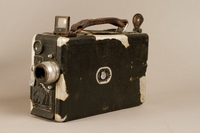
Kodak 16mm movie camera used by an American in prewar Vienna
Object
Small, windup, 16mm Kodak motion picture camera used by Ross Baker and his wife, Helen, in Austria and Italy in 1937-1938. They used the camera to film family vacations and the historic scenes they witnessed, such as the Anschluss in Vienna, visits by Hitler, and the defacement and boycotting of Jewish businesses. Ross had a badge identifying him as a delegate to a convention and was allowed to film Hitler and others at close range. See the film material in this collection (2006.265.2) for the footage. Ross was a chemist and professor at the City University of New York. In 1937, he received a sabbatical leave to study at the University of Vienna. He lived there with his wife and five sons from early 1937 until May 1938. On March 13, 1938, Austria was incorporated into Nazi Germany. The Germans enacted anti-Jewish laws immediately. On April 10, there was a vote on the merger and 99% of the population voted Yes in support of Hitler as Fuhrer. Jews were among those who had been stripped of their rights as citizens, including the right to vote.

Toy Nazi SA figurine in a brown uniform with swastika armband acquired by a US family in Vienna
Object
Brown uniformed Nazi SA toy figure acquired by the sons of Ross and Helen Baker in prewar Vienna, Austria. Brownshirts or Storm Troopers were members of the SA [Stormabeiltung], a Nazi Party paramilitary organization whose violent intimidation tactics were key to Hitler's rise to power. The toy was one of a series of Nazi themed figurines created by O. & M. Hausser in the 1930s. Ross was a chemist and professor at the City University of New York. In 1937, he received a sabbatical to study at the University of Vienna and moved there with his wife and five sons. During this time, the family witnessed many historic events, such as the Anschluss and its aftermath in Vienna, visits by Hitler and other German officials, and the defacement and boycotting of Jewish businesses. On March 12, 1938, German troops marched into Austria and, the next day, Austria was incorporated into Nazi Germany. The Germans enacted anti-Jewish laws immediately. On April 10, there was a vote on the merger and 99% of the population voted Yes in support of Hitler as Fuhrer. Jews were among those who had been stripped of their rights as citizens, including the right to vote.

Toy Nazi SS figurine in a black uniform with swastika armband acquired by a US family in Vienna
Object
Black uniformed Nazi SS toy figure acquired for the sons of Ross and Helen Baker in prewar Vienna, Austria. Black shirts were worn by the SS [Schutz Staffel] after 1932. The SS was a police and military organization in charge of Security in the Third Reich. The toy was one of a series of Nazi themed figurines created by O. & M. Hausser in the 1930s. Ross was a chemist and professor at the City University of New York. In 1937, he received a sabbatical leave to study at the University of Vienna and moved there with his wife and five sons. During this time, the family witnessed many historic events, such as the Anschluss and its aftermath in Vienna, visits by Hitler and other German officials, and the defacement and boycotting of Jewish businesses. On March 12, 1938, German troops marched into Vienna and, the next day, Austria was incorporated into Nazi Germany. The German enacted anti-Jewish laws immediately. On April 10, there was a popular vote on the merger and 99% of the population voted Yes in support of Hitler as Fuhrer. Jews were among those who had already been stripped of their rights as citizens, including the right to vote.

Toy Nazi Wehrmacht figurine in a green uniform with a rifle acquired by a US family in Vienna
Object
Green uniformed Wehrmacht (German Army) toy soldier figure acquired for the sons of Ross and Helen Baker in prewar Vienna, Austria. The toy was part of a series of Nazi themed figurines created by O. & M. Hausser in the 1930s. Ross was a chemist and professor at the City University of New York. In 1937, he received a sabbatical leave to study at the University of Vienna and moved there with his wife and five sons. During this time, the family witnessed many historic events, such as the Anschluss and its aftermath in Vienna, visits by Hitler and other German officials, and the defacement and boycotting of Jewish businesses. On March 12, 1938, German troops marched into Vienna and, the next day, Austria was incorporated into Nazi Germany. The German enacted anti-Jewish laws immediately. On April 10, there was a popular vote on the merger and 99% of the population voted Yes in support of Hitler as Fuhrer. Jews were among those who had already been stripped of their rights as citizens, including the right to vote.
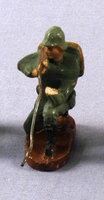
Toy Nazi Wehrmacht figurine in a green uniform crouching with a rifle acquired by a US family in Vienna
Object
Green uniformed Wehrmacht (German Army) toy soldier figure acquired for the sons of Ross and Helen Baker in prewar Vienna, Austria. The toy was one of a series of Nazi themed figurines created by O. & M. Hausser in the 1930s. Ross was a chemist and professor at the City University of New York. In 1937, he received a sabbatical leave to study at the University of Vienna and moved there with his wife and five sons. During this time, the family witnessed many historic events, such as the Anschluss and its aftermath in Vienna, visits by Hitler and other German officials, and the defacement and boycotting of Jewish businesses. On March 12, 1938, German troops marched into Vienna and, the next day, Austria was incorporated into Nazi Germany. The German enacted anti-Jewish laws immediately. On April 10, there was a popular vote on the merger and 99% of the population voted Yes in support of Hitler as Fuhrer. Jews were among those who had already been stripped of their rights as citizens, including the right to vote.

Toy Nazi figurine in a gold shirt with a swastika armband acquired by a US family in prewar Vienna
Object
Nazi toy figure in a gold shirt, black pants, and hat acquired for the sons of Ross and Helen Baker in prewar Vienna, Austria. The toy was one of a series of Nazi themed figurines created by O. & M. Hausser in the 1930s. Ross was a chemist and professor at the City University of New York. In 1937, he received a sabbatical leave to study at the University of Vienna and moved there with his wife and five sons. During this time, the family witnessed many historic events, such as the Anschluss and its aftermath in Vienna, visits by Hitler and other German officials, and the defacement and boycotting of Jewish businesses. On March 12, 1938, German troops marched into Vienna and, the next day, Austria was incorporated into Nazi Germany. The German enacted anti-Jewish laws immediately. On April 10, there was a popular vote on the merger and 99% of the population voted Yes in support of Hitler as Fuhrer. Jews were among those who had already been stripped of their rights as citizens, including the right to vote.

Toy figurine of Hitler in a brown belted uniform acquired by a US family in prewar Vienna
Object
Toy figure of Hitler acquired for the sons of Ross and Helen Baker in prewar Vienna, Austria. The toy was one of a series of Nazi themed figurines created by O. & M. Hausser in the 1930s. Ross was a chemist and professor at the City University of New York. In 1937, he received a sabbatical leave to study at the University of Vienna and moved there with his wife and five sons. During this time, the family witnessed many historic events, such as the Anschluss and its aftermath in Vienna, visits by Hitler and other German officials, and the defacement and boycotting of Jewish businesses. On March 12, 1938, German troops marched into Vienna and, the next day, Austria was incorporated into Nazi Germany. The German enacted anti-Jewish laws immediately. On April 10, there was a popular vote on the merger and 99% of the population voted Yes in support of Hitler as Fuhrer. Jews were among those who had already been stripped of their rights as citizens, including the right to vote.
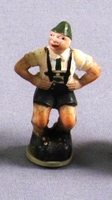
Toy figurine of a man in traditional Austrian dress acquired by a US family in prewar Vienna
Object
Toy male figure in green lederhosen and cap acquired for the sons of Ross and Helen Baker in prewar Vienna, Austria. The toy was one of a series of themed figurines created by O. & M. Hausser in the 1930s. Ross was a chemist and professor at the City University of New York. In 1937, he received a sabbatical leave to study at the University of Vienna and moved there with his wife and five sons. During this time, the family witnessed many historic events, such as the Anschluss and its aftermath in Vienna, visits by Hitler and other German officials, and the defacement and boycotting of Jewish businesses. On March 12, 1938, German troops marched into Vienna and, the next day, Austria was incorporated into Nazi Germany. The German enacted anti-Jewish laws immediately. On April 10, there was a popular vote on the merger and 99% of the population voted Yes in support of Hitler as Fuhrer. Jews were among those who had already been stripped of their rights as citizens, including the right to vote.
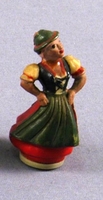
Toy figurine of a woman in traditional Austrian dress acquired by a US family in prewar Vienna
Object
Toy female figure in green dirndl acquired for the sons of Ross and Helen Baker in prewar Vienna, Austria. The toy was one of a series of themed figurines created by O. & M. Hausser in the 1930s. Ross was a chemist and professor at the City University of New York. In 1937, he received a sabbatical leave to study at the University of Vienna and moved there with his wife and five sons. During this time, the family witnessed many historic events, such as the Anschluss and its aftermath in Vienna, visits by Hitler and other German officials, and the defacement and boycotting of Jewish businesses. On March 12, 1938, German troops marched into Vienna and, the next day, Austria was incorporated into Nazi Germany. The German enacted anti-Jewish laws immediately. On April 10, there was a popular vote on the merger and 99% of the population voted Yes in support of Hitler as Fuhrer. Jews were among those who had already been stripped of their rights as citizens, including the right to vote.
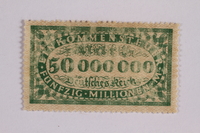
Income tax stamp, 50 million marks, issued in Weimar Germany
Object
Income tax stamp, valued at 50 million Reichsmarks, issued in Weimar Germany during the hyperinflation period, and later acquired by Ross Baker while living in Austria from 1937-1938. According to the German Reich Income Tax Act of 1920, employers were required to withhold taxation payments from their employee’s salaries or wages. Each employee was issued a tax record book by the local tax offices, and for each pay period, the employer would adhere a stamp for the amount of money withheld for taxes. The German government attempted to solve their post-World War I financial struggles by printing more money, which led to severe inflation. As the rate of inflation grew to critical levels between 1922 and 1923, the government printed higher and higher denominations, but was unable to keep up with the plunging rates. To keep pace with inflated pay, the government also had to print tax stamps in higher and higher denominations. The introduction of the new Rentenmark on November 16, 1923, successfully ended the hyperinflation. Despite this, the Nazi Party continued to use people’s residual economic fears as a propaganda tool to gain power, eventually leading to Adolf Hitler becoming Chancellor in 1933. In 1937, Ross Baker was on sabbatical from his teaching position at the College of the City of New York. His wife, Helen, and their sons accompanied him to Austria during the academic year 1937-1938 so he could take courses in microchemistry at the University of Vienna. The boys attended school while in Europe and the family traveled during the summers. They were in Vienna on March 13, 1938, when Austria was annexed into Germany, in what became known as the "Anschluss," as well as during Adolf Hitler’s subsequent visit.
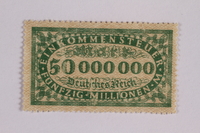
Income tax stamp, 50 million marks, issued in Weimar Germany
Object
Income tax stamp, valued at 50 million Reichsmarks, issued in Weimar Germany during the hyperinflation period, and later acquired by Ross Baker while living in Austria from 1937-1938. According to the German Reich Income Tax Act of 1920, employers were required to withhold taxation payments from their employee’s salaries or wages. Each employee was issued a tax record book by the local tax offices, and for each pay period, the employer would adhere a stamp for the amount of money withheld for taxes. The German government attempted to solve their post-World War I financial struggles by printing more money, which led to severe inflation. As the rate of inflation grew to critical levels between 1922 and 1923, the government printed higher and higher denominations, but was unable to keep up with the plunging rates. To keep pace with inflated pay, the government also had to print tax stamps in higher and higher denominations. The introduction of the new Rentenmark on November 16, 1923, successfully ended the hyperinflation. Despite this, the Nazi Party continued to use people’s residual economic fears as a propaganda tool to gain power, eventually leading to Adolf Hitler becoming Chancellor in 1933. In 1937, Ross Baker was on sabbatical from his teaching position at the College of the City of New York. His wife, Helen, and their sons accompanied him to Austria during the academic year 1937-1938 so he could take courses in microchemistry at the University of Vienna. The boys attended school while in Europe and the family traveled during the summers. They were in Vienna on March 13, 1938, when Austria was annexed into Germany, in what became known as the "Anschluss," as well as during Adolf Hitler’s subsequent visit.
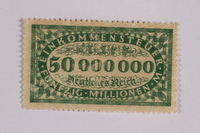
Income tax stamp, 50 million marks, issued in Weimar Germany
Object
Income tax stamp, valued at 50 million Reichsmarks, issued in Weimar Germany during the hyperinflation period, and later acquired by Ross Baker while living in Austria from 1937-1938. According to the German Reich Income Tax Act of 1920, employers were required to withhold taxation payments from their employee’s salaries or wages. Each employee was issued a tax record book by the local tax offices, and for each pay period, the employer would adhere a stamp for the amount of money withheld for taxes. The German government attempted to solve their post-World War I financial struggles by printing more money, which led to severe inflation. As the rate of inflation grew to critical levels between 1922 and 1923, the government printed higher and higher denominations, but was unable to keep up with the plunging rates. To keep pace with inflated pay, the government also had to print tax stamps in higher and higher denominations. The introduction of the new Rentenmark on November 16, 1923, successfully ended the hyperinflation. Despite this, the Nazi Party continued to use people’s residual economic fears as a propaganda tool to gain power, eventually leading to Adolf Hitler becoming Chancellor in 1933. In 1937, Ross Baker was on sabbatical from his teaching position at the College of the City of New York. His wife, Helen, and their sons accompanied him to Austria during the academic year 1937-1938 so he could take courses in microchemistry at the University of Vienna. The boys attended school while in Europe and the family traveled during the summers. They were in Vienna on March 13, 1938, when Austria was annexed into Germany, in what became known as the "Anschluss," as well as during Adolf Hitler’s subsequent visit.
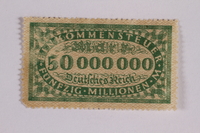
Income tax stamp, 50 million marks, issued in Weimar Germany
Object
Income tax stamp, valued at 50 million Reichsmarks, issued in Weimar Germany during the hyperinflation period, and later acquired by Ross Baker while living in Austria from 1937-1938. According to the German Reich Income Tax Act of 1920, employers were required to withhold taxation payments from their employee’s salaries or wages. Each employee was issued a tax record book by the local tax offices, and for each pay period, the employer would adhere a stamp for the amount of money withheld for taxes. The German government attempted to solve their post-World War I financial struggles by printing more money, which led to severe inflation. As the rate of inflation grew to critical levels between 1922 and 1923, the government printed higher and higher denominations, but was unable to keep up with the plunging rates. To keep pace with inflated pay, the government also had to print tax stamps in higher and higher denominations. The introduction of the new Rentenmark on November 16, 1923, successfully ended the hyperinflation. Despite this, the Nazi Party continued to use people’s residual economic fears as a propaganda tool to gain power, eventually leading to Adolf Hitler becoming Chancellor in 1933. In 1937, Ross Baker was on sabbatical from his teaching position at the College of the City of New York. His wife, Helen, and their sons accompanied him to Austria during the academic year 1937-1938 so he could take courses in microchemistry at the University of Vienna. The boys attended school while in Europe and the family traveled during the summers. They were in Vienna on March 13, 1938, when Austria was annexed into Germany, in what became known as the "Anschluss," as well as during Adolf Hitler’s subsequent visit.
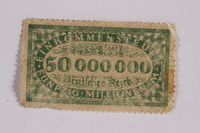
Income tax stamp, 50 million marks, issued in Weimar Germany
Object
Income tax stamp, valued at 50 million Reichsmarks, issued in Weimar Germany during the hyperinflation period, and later acquired by Ross Baker while living in Austria from 1937-1938. According to the German Reich Income Tax Act of 1920, employers were required to withhold taxation payments from their employee’s salaries or wages. Each employee was issued a tax record book by the local tax offices, and for each pay period, the employer would adhere a stamp for the amount of money withheld for taxes. The German government attempted to solve their post-World War I financial struggles by printing more money, which led to severe inflation. As the rate of inflation grew to critical levels between 1922 and 1923, the government printed higher and higher denominations, but was unable to keep up with the plunging rates. To keep pace with inflated pay, the government also had to print tax stamps in higher and higher denominations. The introduction of the new Rentenmark on November 16, 1923, successfully ended the hyperinflation. Despite this, the Nazi Party continued to use people’s residual economic fears as a propaganda tool to gain power, eventually leading to Adolf Hitler becoming Chancellor in 1933. In 1937, Ross Baker was on sabbatical from his teaching position at the College of the City of New York. His wife, Helen, and their sons accompanied him to Austria during the academic year 1937-1938 so he could take courses in microchemistry at the University of Vienna. The boys attended school while in Europe and the family traveled during the summers. They were in Vienna on March 13, 1938, when Austria was annexed into Germany, in what became known as the "Anschluss," as well as during Adolf Hitler’s subsequent visit.
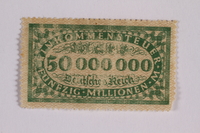
Income tax stamp, 50 million marks, issued in Weimar Germany
Object
Income tax stamp, valued at 50 million Reichsmarks, issued in Weimar Germany during the hyperinflation period, and later acquired by Ross Baker while living in Austria from 1937-1938. According to the German Reich Income Tax Act of 1920, employers were required to withhold taxation payments from their employee’s salaries or wages. Each employee was issued a tax record book by the local tax offices, and for each pay period, the employer would adhere a stamp for the amount of money withheld for taxes. The German government attempted to solve their post-World War I financial struggles by printing more money, which led to severe inflation. As the rate of inflation grew to critical levels between 1922 and 1923, the government printed higher and higher denominations, but was unable to keep up with the plunging rates. To keep pace with inflated pay, the government also had to print tax stamps in higher and higher denominations. The introduction of the new Rentenmark on November 16, 1923, successfully ended the hyperinflation. Despite this, the Nazi Party continued to use people’s residual economic fears as a propaganda tool to gain power, eventually leading to Adolf Hitler becoming Chancellor in 1933. In 1937, Ross Baker was on sabbatical from his teaching position at the College of the City of New York. His wife, Helen, and their sons accompanied him to Austria during the academic year 1937-1938 so he could take courses in microchemistry at the University of Vienna. The boys attended school while in Europe and the family traveled during the summers. They were in Vienna on March 13, 1938, when Austria was annexed into Germany, in what became known as the "Anschluss," as well as during Adolf Hitler’s subsequent visit.
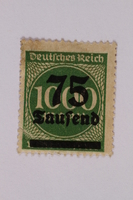
Postage stamp, 1000 mark, issued in Germany during hyperinflation in the Weimar Republic
Object
German postage stamp for 1000 marks acquired by Ross Baker in prewar Vienna, Austria. It is an example of the hyperinflation of the Weimar Republic of Germany from about 1915-1924. Ross was a chemist and professor at the City University of New York. In 1937, he received a sabbatical leave to study at the University of Vienna and moved there with his wife and five sons. During this time, the family witnessed many historic events, such as the Anschluss and its aftermath in Vienna, visits by Hitler and other German officials, and the defacement and boycotting of Jewish businesses. On March 12, 1938, German troops marched into Vienna and, the next day, Austria was incorporated into Nazi Germany. The German enacted anti-Jewish laws immediately. On April 10, there was a popular vote on the merger and 99% of the population voted Yes in support of Hitler as Fuhrer. Jews were among those who had already been stripped of their rights as citizens, including the right to vote.
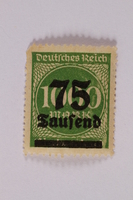
Postage stamp, 1000 mark, issued in Germany during hyperinflation in the Weimar Republic
Object
German postage stamp for 1000 marks acquired by Ross Baker in prewar Vienna, Austria. It is an example of the hyperinflation of the Weimar Republic of Germany from about 1915-1924. Ross was a chemist and professor at the City University of New York. In 1937, he received a sabbatical leave to study at the University of Vienna and moved there with his wife and five sons. During this time, the family witnessed many historic events, such as the Anschluss and its aftermath in Vienna, visits by Hitler and other German officials, and the defacement and boycotting of Jewish businesses. On March 12, 1938, German troops marched into Vienna and, the next day, Austria was incorporated into Nazi Germany. The German enacted anti-Jewish laws immediately. On April 10, there was a popular vote on the merger and 99% of the population voted Yes in support of Hitler as Fuhrer. Jews were among those who had already been stripped of their rights as citizens, including the right to vote.
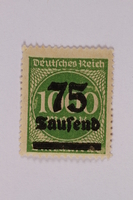
Postage stamp, 1000 mark, issued in Germany during hyperinflation in the Weimar Republic
Object
German postage stamp for 1000 marks acquired by Ross Baker in prewar Vienna, Austria. It is an example of the hyperinflation of the Weimar Republic of Germany from about 1915-1924. Ross was a chemist and professor at the City University of New York. In 1937, he received a sabbatical leave to study at the University of Vienna and moved there with his wife and five sons. During this time, the family witnessed many historic events, such as the Anschluss and its aftermath in Vienna, visits by Hitler and other German officials, and the defacement and boycotting of Jewish businesses. On March 12, 1938, German troops marched into Vienna and, the next day, Austria was incorporated into Nazi Germany. The German enacted anti-Jewish laws immediately. On April 10, there was a popular vote on the merger and 99% of the population voted Yes in support of Hitler as Fuhrer. Jews were among those who had already been stripped of their rights as citizens, including the right to vote.

Postage stamp, 1000 mark, issued in Germany during hyperinflation in the Weimar Republic
Object
German postage stamp for 1000 marks acquired by Ross Baker in prewar Vienna, Austria. It is an example of the hyperinflation of the Weimar Republic of Germany from about 1915-1924. Ross was a chemist and professor at the City University of New York. In 1937, he received a sabbatical leave to study at the University of Vienna and moved there with his wife and five sons. During this time, the family witnessed many historic events, such as the Anschluss and its aftermath in Vienna, visits by Hitler and other German officials, and the defacement and boycotting of Jewish businesses. On March 12, 1938, German troops marched into Vienna and, the next day, Austria was incorporated into Nazi Germany. The German enacted anti-Jewish laws immediately. On April 10, there was a popular vote on the merger and 99% of the population voted Yes in support of Hitler as Fuhrer. Jews were among those who had already been stripped of their rights as citizens, including the right to vote.
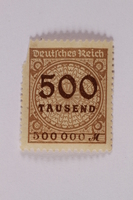
Postage stamp, 1000 mark, issued in Germany during hyperinflation in the Weimar Republic
Object
German postage stamp for 1000 marks acquired by Ross Baker in prewar Vienna, Austria. It is an example of the hyperinflation of the Weimar Republic of Germany from about 1915-1924. Ross was a chemist and professor at the City University of New York. In 1937, he received a sabbatical leave to study at the University of Vienna and moved there with his wife and five sons. During this time, the family witnessed many historic events, such as the Anschluss and its aftermath in Vienna, visits by Hitler and other German officials, and the defacement and boycotting of Jewish businesses. On March 12, 1938, German troops marched into Vienna and, the next day, Austria was incorporated into Nazi Germany. The German enacted anti-Jewish laws immediately. On April 10, there was a popular vote on the merger and 99% of the population voted Yes in support of Hitler as Fuhrer. Jews were among those who had already been stripped of their rights as citizens, including the right to vote.

Postage stamp, 500 mark, issued in Germany during hyperinflation in the Weimar Republic
Object
German postage stamp for 500 marks acquired by Ross Baker in prewar Vienna, Austria. It is an example of the hyperinflation of the Weimar Republic of Germany from about 1915-1924. Ross was a chemist and professor at the City University of New York. In 1937, he received a sabbatical leave to study at the University of Vienna and moved there with his wife and five sons. During this time, the family witnessed many historic events, such as the Anschluss and its aftermath in Vienna, visits by Hitler and other German officials, and the defacement and boycotting of Jewish businesses. On March 12, 1938, German troops marched into Vienna and, the next day, Austria was incorporated into Nazi Germany. The German enacted anti-Jewish laws immediately. On April 10, there was a popular vote on the merger and 99% of the population voted Yes in support of Hitler as Fuhrer. Jews were among those who had already been stripped of their rights as citizens, including the right to vote.
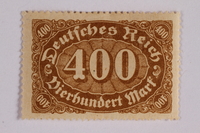
Postage stamp, 500 mark, issued in Germany during hyperinflation in the Weimar Republic
Object
German postage stamp for 500 marks acquired by Ross Baker in prewar Vienna, Austria. It is an example of the hyperinflation of the Weimar Republic of Germany from about 1915-1924. Ross was a chemist and professor at the City University of New York. In 1937, he received a sabbatical leave to study at the University of Vienna and moved there with his wife and five sons. During this time, the family witnessed many historic events, such as the Anschluss and its aftermath in Vienna, visits by Hitler and other German officials, and the defacement and boycotting of Jewish businesses. On March 12, 1938, German troops marched into Vienna and, the next day, Austria was incorporated into Nazi Germany. The German enacted anti-Jewish laws immediately. On April 10, there was a popular vote on the merger and 99% of the population voted Yes in support of Hitler as Fuhrer. Jews were among those who had already been stripped of their rights as citizens, including the right to vote.
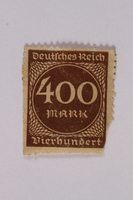
Postage stamp, 400 mark, issued in Germany during hyperinflation in the Weimar Republic
Object
German postage stamp for 400 marks acquired by Ross Baker in prewar Vienna, Austria. It is an example of the hyperinflation of the Weimar Republic of Germany from about 1915-1924. Ross was a chemist and professor at the City University of New York. In 1937, he received a sabbatical leave to study at the University of Vienna and moved there with his wife and five sons. During this time, the family witnessed many historic events, such as the Anschluss and its aftermath in Vienna, visits by Hitler and other German officials, and the defacement and boycotting of Jewish businesses. On March 12, 1938, German troops marched into Vienna and, the next day, Austria was incorporated into Nazi Germany. The German enacted anti-Jewish laws immediately. On April 10, there was a popular vote on the merger and 99% of the population voted Yes in support of Hitler as Fuhrer. Jews were among those who had already been stripped of their rights as citizens, including the right to vote.

Postage stamp, 400 mark, issued in Germany during hyperinflation in the Weimar Republic
Object
German postage stamp for 400 marks acquired by Ross Baker in prewar Vienna, Austria. It is an example of the hyperinflation of the Weimar Republic of Germany from about 1915-1924. Ross was a chemist and professor at the City University of New York. In 1937, he received a sabbatical leave to study at the University of Vienna and moved there with his wife and five sons. During this time, the family witnessed many historic events, such as the Anschluss and its aftermath in Vienna, visits by Hitler and other German officials, and the defacement and boycotting of Jewish businesses. On March 12, 1938, German troops marched into Vienna and, the next day, Austria was incorporated into Nazi Germany. The German enacted anti-Jewish laws immediately. On April 10, there was a popular vote on the merger and 99% of the population voted Yes in support of Hitler as Fuhrer. Jews were among those who had already been stripped of their rights as citizens, including the right to vote.

Postage stamp, 400 mark, issued in Germany during hyperinflation in the Weimar Republic
Object
German postage stamp for 400 marks acquired by Ross Baker in prewar Vienna, Austria. It is an example of the hyperinflation of the Weimar Republic of Germany from about 1915-1924. Ross was a chemist and professor at the City University of New York. In 1937, he received a sabbatical leave to study at the University of Vienna and moved there with his wife and five sons. During this time, the family witnessed many historic events, such as the Anschluss and its aftermath in Vienna, visits by Hitler and other German officials, and the defacement and boycotting of Jewish businesses. On March 12, 1938, German troops marched into Vienna and, the next day, Austria was incorporated into Nazi Germany. The German enacted anti-Jewish laws immediately. On April 10, there was a popular vote on the merger and 99% of the population voted Yes in support of Hitler as Fuhrer. Jews were among those who had already been stripped of their rights as citizens, including the right to vote.
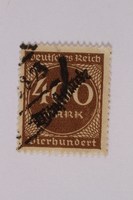
Postage stamp, 400 mark, issued in Germany during hyperinflation in the Weimar Republic
Object
German postage stamp for 400 marks acquired by Ross Baker in prewar Vienna, Austria. It is an example of the hyperinflation of the Weimar Republic of Germany from about 1915-1924. Ross was a chemist and professor at the City University of New York. In 1937, he received a sabbatical leave to study at the University of Vienna and moved there with his wife and five sons. During this time, the family witnessed many historic events, such as the Anschluss and its aftermath in Vienna, visits by Hitler and other German officials, and the defacement and boycotting of Jewish businesses. On March 12, 1938, German troops marched into Vienna and, the next day, Austria was incorporated into Nazi Germany. The German enacted anti-Jewish laws immediately. On April 10, there was a popular vote on the merger and 99% of the population voted Yes in support of Hitler as Fuhrer. Jews were among those who had already been stripped of their rights as citizens, including the right to vote.

Postage stamp, 400 mark, issued in Germany during hyperinflation in the Weimar Republic
Object
German postage stamp for 400 marks acquired by Ross Baker in prewar Vienna, Austria. It is an example of the hyperinflation of the Weimar Republic of Germany from about 1915-1924. Ross was a chemist and professor at the City University of New York. In 1937, he received a sabbatical leave to study at the University of Vienna and moved there with his wife and five sons. During this time, the family witnessed many historic events, such as the Anschluss and its aftermath in Vienna, visits by Hitler and other German officials, and the defacement and boycotting of Jewish businesses. On March 12, 1938, German troops marched into Vienna and, the next day, Austria was incorporated into Nazi Germany. The German enacted anti-Jewish laws immediately. On April 10, there was a popular vote on the merger and 99% of the population voted Yes in support of Hitler as Fuhrer. Jews were among those who had already been stripped of their rights as citizens, including the right to vote.
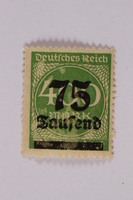
Postage stamp, 400 mark, issued in Germany during hyperinflation in the Weimar Republic
Object
German postage stamp for 400 marks acquired by Ross Baker in prewar Vienna, Austria. It is an example of the hyperinflation of the Weimar Republic of Germany from about 1915-1924. Ross was a chemist and professor at the City University of New York. In 1937, he received a sabbatical leave to study at the University of Vienna and moved there with his wife and five sons. During this time, the family witnessed many historic events, such as the Anschluss and its aftermath in Vienna, visits by Hitler and other German officials, and the defacement and boycotting of Jewish businesses. On March 12, 1938, German troops marched into Vienna and, the next day, Austria was incorporated into Nazi Germany. The German enacted anti-Jewish laws immediately. On April 10, there was a popular vote on the merger and 99% of the population voted Yes in support of Hitler as Fuhrer. Jews were among those who had already been stripped of their rights as citizens, including the right to vote.
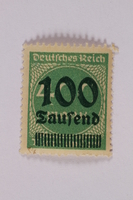
Postage stamp, 400 mark, issued in Germany during hyperinflation in the Weimar Republic
Object
German postage stamp for 400 marks acquired by Ross Baker in prewar Vienna, Austria. It is an example of the hyperinflation of the Weimar Republic of Germany from about 1915-1924. Ross was a chemist and professor at the City University of New York. In 1937, he received a sabbatical leave to study at the University of Vienna and moved there with his wife and five sons. During this time, the family witnessed many historic events, such as the Anschluss and its aftermath in Vienna, visits by Hitler and other German officials, and the defacement and boycotting of Jewish businesses. On March 12, 1938, German troops marched into Vienna and, the next day, Austria was incorporated into Nazi Germany. The German enacted anti-Jewish laws immediately. On April 10, there was a popular vote on the merger and 99% of the population voted Yes in support of Hitler as Fuhrer. Jews were among those who had already been stripped of their rights as citizens, including the right to vote.
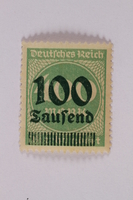
Postage stamp, 400 mark, issued in Germany during hyperinflation in the Weimar Republic
Object
German postage stamp for 400 marks acquired by Ross Baker in prewar Vienna, Austria. It is an example of the hyperinflation of the Weimar Republic of Germany from about 1915-1924. Ross was a chemist and professor at the City University of New York. In 1937, he received a sabbatical leave to study at the University of Vienna and moved there with his wife and five sons. During this time, the family witnessed many historic events, such as the Anschluss and its aftermath in Vienna, visits by Hitler and other German officials, and the defacement and boycotting of Jewish businesses. On March 12, 1938, German troops marched into Vienna and, the next day, Austria was incorporated into Nazi Germany. The German enacted anti-Jewish laws immediately. On April 10, there was a popular vote on the merger and 99% of the population voted Yes in support of Hitler as Fuhrer. Jews were among those who had already been stripped of their rights as citizens, including the right to vote.
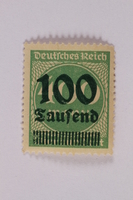
Postage stamp, 400 mark, issued in Germany during hyperinflation in the Weimar Republic
Object
German postage stamp for 400 marks acquired by Ross Baker in prewar Vienna, Austria. It is an example of the hyperinflation of the Weimar Republic of Germany from about 1915-1924. Ross was a chemist and professor at the City University of New York. In 1937, he received a sabbatical leave to study at the University of Vienna and moved there with his wife and five sons. During this time, the family witnessed many historic events, such as the Anschluss and its aftermath in Vienna, visits by Hitler and other German officials, and the defacement and boycotting of Jewish businesses. On March 12, 1938, German troops marched into Vienna and, the next day, Austria was incorporated into Nazi Germany. The German enacted anti-Jewish laws immediately. On April 10, there was a popular vote on the merger and 99% of the population voted Yes in support of Hitler as Fuhrer. Jews were among those who had already been stripped of their rights as citizens, including the right to vote.
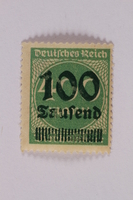
Postage stamp, 400 mark, issued in Germany during hyperinflation in the Weimar Republic
Object
German postage stamp for 400 marks acquired by Ross Baker in prewar Vienna, Austria. It is an example of the hyperinflation of the Weimar Republic of Germany from about 1915-1924. Ross was a chemist and professor at the City University of New York. In 1937, he received a sabbatical leave to study at the University of Vienna and moved there with his wife and five sons. During this time, the family witnessed many historic events, such as the Anschluss and its aftermath in Vienna, visits by Hitler and other German officials, and the defacement and boycotting of Jewish businesses. On March 12, 1938, German troops marched into Vienna and, the next day, Austria was incorporated into Nazi Germany. The German enacted anti-Jewish laws immediately. On April 10, there was a popular vote on the merger and 99% of the population voted Yes in support of Hitler as Fuhrer. Jews were among those who had already been stripped of their rights as citizens, including the right to vote.

Postage stamp, 400 mark, issued in Germany during hyperinflation in the Weimar Republic
Object
German postage stamp for 400 marks acquired by Ross Baker in prewar Vienna, Austria. It is an example of the hyperinflation of the Weimar Republic of Germany from about 1915-1924. Ross was a chemist and professor at the City University of New York. In 1937, he received a sabbatical leave to study at the University of Vienna and moved there with his wife and five sons. During this time, the family witnessed many historic events, such as the Anschluss and its aftermath in Vienna, visits by Hitler and other German officials, and the defacement and boycotting of Jewish businesses. On March 12, 1938, German troops marched into Vienna and, the next day, Austria was incorporated into Nazi Germany. The German enacted anti-Jewish laws immediately. On April 10, there was a popular vote on the merger and 99% of the population voted Yes in support of Hitler as Fuhrer. Jews were among those who had already been stripped of their rights as citizens, including the right to vote.

Postage stamp, 300 mark, issued in Germany during hyperinflation in the Weimar Republic
Object
German postage stamp for 300 marks acquired by Ross Baker in prewar Vienna, Austria. It is an example of the hyperinflation of the Weimar Republic of Germany from about 1915-1924. Ross was a chemist and professor at the City University of New York. In 1937, he received a sabbatical leave to study at the University of Vienna and moved there with his wife and five sons. During this time, the family witnessed many historic events, such as the Anschluss and its aftermath in Vienna, visits by Hitler and other German officials, and the defacement and boycotting of Jewish businesses. On March 12, 1938, German troops marched into Vienna and, the next day, Austria was incorporated into Nazi Germany. The German enacted anti-Jewish laws immediately. On April 10, there was a popular vote on the merger and 99% of the population voted Yes in support of Hitler as Fuhrer. Jews were among those who had already been stripped of their rights as citizens, including the right to vote.
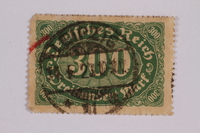
Postage stamp, 300 mark, issued in Germany during hyperinflation in the Weimar Republic
Object
German postage stamp for 300 marks acquired by Ross Baker in prewar Vienna, Austria. It is an example of the hyperinflation of the Weimar Republic of Germany from about 1915-1924. Ross was a chemist and professor at the City University of New York. In 1937, he received a sabbatical leave to study at the University of Vienna and moved there with his wife and five sons. During this time, the family witnessed many historic events, such as the Anschluss and its aftermath in Vienna, visits by Hitler and other German officials, and the defacement and boycotting of Jewish businesses. On March 12, 1938, German troops marched into Vienna and, the next day, Austria was incorporated into Nazi Germany. The German enacted anti-Jewish laws immediately. On April 10, there was a popular vote on the merger and 99% of the population voted Yes in support of Hitler as Fuhrer. Jews were among those who had already been stripped of their rights as citizens, including the right to vote.
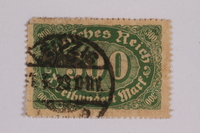
Postage stamp, 300 mark, issued in Germany during hyperinflation in the Weimar Republic
Object
German postage stamp for 300 marks acquired by Ross Baker in prewar Vienna, Austria. It is an example of the hyperinflation of the Weimar Republic of Germany from about 1915-1924. Ross was a chemist and professor at the City University of New York. In 1937, he received a sabbatical leave to study at the University of Vienna and moved there with his wife and five sons. During this time, the family witnessed many historic events, such as the Anschluss and its aftermath in Vienna, visits by Hitler and other German officials, and the defacement and boycotting of Jewish businesses. On March 12, 1938, German troops marched into Vienna and, the next day, Austria was incorporated into Nazi Germany. The German enacted anti-Jewish laws immediately. On April 10, there was a popular vote on the merger and 99% of the population voted Yes in support of Hitler as Fuhrer. Jews were among those who had already been stripped of their rights as citizens, including the right to vote.
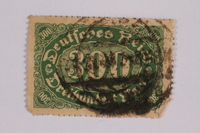
Postage stamp, 300 mark, issued in Germany during hyperinflation in the Weimar Republic
Object
German postage stamp for 300 marks acquired by Ross Baker in prewar Vienna, Austria. It is an example of the hyperinflation of the Weimar Republic of Germany from about 1915-1924. Ross was a chemist and professor at the City University of New York. In 1937, he received a sabbatical leave to study at the University of Vienna and moved there with his wife and five sons. During this time, the family witnessed many historic events, such as the Anschluss and its aftermath in Vienna, visits by Hitler and other German officials, and the defacement and boycotting of Jewish businesses. On March 12, 1938, German troops marched into Vienna and, the next day, Austria was incorporated into Nazi Germany. The German enacted anti-Jewish laws immediately. On April 10, there was a popular vote on the merger and 99% of the population voted Yes in support of Hitler as Fuhrer. Jews were among those who had already been stripped of their rights as citizens, including the right to vote.
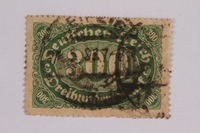
Postage stamp, 300 mark, issued in Germany during hyperinflation in the Weimar Republic
Object
German postage stamp for 300 marks acquired by Ross Baker in prewar Vienna, Austria. It is an example of the hyperinflation of the Weimar Republic of Germany from about 1915-1924. Ross was a chemist and professor at the City University of New York. In 1937, he received a sabbatical leave to study at the University of Vienna and moved there with his wife and five sons. During this time, the family witnessed many historic events, such as the Anschluss and its aftermath in Vienna, visits by Hitler and other German officials, and the defacement and boycotting of Jewish businesses. On March 12, 1938, German troops marched into Vienna and, the next day, Austria was incorporated into Nazi Germany. The German enacted anti-Jewish laws immediately. On April 10, there was a popular vote on the merger and 99% of the population voted Yes in support of Hitler as Fuhrer. Jews were among those who had already been stripped of their rights as citizens, including the right to vote.
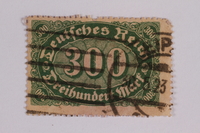
Postage stamp, 300 mark, issued in Germany during hyperinflation in the Weimar Republic
Object
German postage stamp for 300 marks acquired by Ross Baker in prewar Vienna, Austria. It is an example of the hyperinflation of the Weimar Republic of Germany from about 1915-1924. Ross was a chemist and professor at the City University of New York. In 1937, he received a sabbatical leave to study at the University of Vienna and moved there with his wife and five sons. During this time, the family witnessed many historic events, such as the Anschluss and its aftermath in Vienna, visits by Hitler and other German officials, and the defacement and boycotting of Jewish businesses. On March 12, 1938, German troops marched into Vienna and, the next day, Austria was incorporated into Nazi Germany. The German enacted anti-Jewish laws immediately. On April 10, there was a popular vote on the merger and 99% of the population voted Yes in support of Hitler as Fuhrer. Jews were among those who had already been stripped of their rights as citizens, including the right to vote.
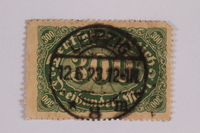
Postage stamp, 300 mark, issued in Germany during hyperinflation in the Weimar Republic
Object
German postage stamp for 300 marks acquired by Ross Baker in prewar Vienna, Austria. It is an example of the hyperinflation of the Weimar Republic of Germany from about 1915-1924. Ross was a chemist and professor at the City University of New York. In 1937, he received a sabbatical leave to study at the University of Vienna and moved there with his wife and five sons. During this time, the family witnessed many historic events, such as the Anschluss and its aftermath in Vienna, visits by Hitler and other German officials, and the defacement and boycotting of Jewish businesses. On March 12, 1938, German troops marched into Vienna and, the next day, Austria was incorporated into Nazi Germany. The German enacted anti-Jewish laws immediately. On April 10, there was a popular vote on the merger and 99% of the population voted Yes in support of Hitler as Fuhrer. Jews were among those who had already been stripped of their rights as citizens, including the right to vote.
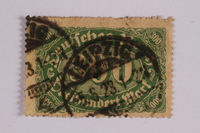
Postage stamp, 300 mark, issued in Germany during hyperinflation in the Weimar Republic
Object
German postage stamp for 300 marks acquired by Ross Baker in prewar Vienna, Austria. It is an example of the hyperinflation of the Weimar Republic of Germany from about 1915-1924. Ross was a chemist and professor at the City University of New York. In 1937, he received a sabbatical leave to study at the University of Vienna and moved there with his wife and five sons. During this time, the family witnessed many historic events, such as the Anschluss and its aftermath in Vienna, visits by Hitler and other German officials, and the defacement and boycotting of Jewish businesses. On March 12, 1938, German troops marched into Vienna and, the next day, Austria was incorporated into Nazi Germany. The German enacted anti-Jewish laws immediately. On April 10, there was a popular vote on the merger and 99% of the population voted Yes in support of Hitler as Fuhrer. Jews were among those who had already been stripped of their rights as citizens, including the right to vote.
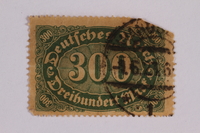
Postage stamp, 300 mark, issued in Germany during hyperinflation in the Weimar Republic
Object
German postage stamp for 300 marks acquired by Ross Baker in prewar Vienna, Austria. It is an example of the hyperinflation of the Weimar Republic of Germany from about 1915-1924. Ross was a chemist and professor at the City University of New York. In 1937, he received a sabbatical leave to study at the University of Vienna and moved there with his wife and five sons. During this time, the family witnessed many historic events, such as the Anschluss and its aftermath in Vienna, visits by Hitler and other German officials, and the defacement and boycotting of Jewish businesses. On March 12, 1938, German troops marched into Vienna and, the next day, Austria was incorporated into Nazi Germany. The German enacted anti-Jewish laws immediately. On April 10, there was a popular vote on the merger and 99% of the population voted Yes in support of Hitler as Fuhrer. Jews were among those who had already been stripped of their rights as citizens, including the right to vote.
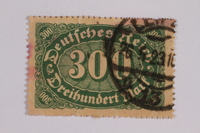
Postage stamp, 300 mark, issued in Germany during hyperinflation in the Weimar Republic
Object
German postage stamp for 300 marks acquired by Ross Baker in prewar Vienna, Austria. It is an example of the hyperinflation of the Weimar Republic of Germany from about 1915-1924. Ross was a chemist and professor at the City University of New York. In 1937, he received a sabbatical leave to study at the University of Vienna and moved there with his wife and five sons. During this time, the family witnessed many historic events, such as the Anschluss and its aftermath in Vienna, visits by Hitler and other German officials, and the defacement and boycotting of Jewish businesses. On March 12, 1938, German troops marched into Vienna and, the next day, Austria was incorporated into Nazi Germany. The German enacted anti-Jewish laws immediately. On April 10, there was a popular vote on the merger and 99% of the population voted Yes in support of Hitler as Fuhrer. Jews were among those who had already been stripped of their rights as citizens, including the right to vote.
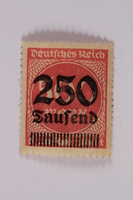
Postage stamp, 500 mark, issued in Germany during hyperinflation in the Weimar Republic
Object
German postage stamp for 500 marks acquired by Ross Baker in prewar Vienna, Austria. It is an example of the hyperinflation of the Weimar Republic of Germany from about 1915-1924. Ross was a chemist and professor at the City University of New York. In 1937, he received a sabbatical leave to study at the University of Vienna and moved there with his wife and five sons. During this time, the family witnessed many historic events, such as the Anschluss and its aftermath in Vienna, visits by Hitler and other German officials, and the defacement and boycotting of Jewish businesses. On March 12, 1938, German troops marched into Vienna and, the next day, Austria was incorporated into Nazi Germany. The German enacted anti-Jewish laws immediately. On April 10, there was a popular vote on the merger and 99% of the population voted Yes in support of Hitler as Fuhrer. Jews were among those who had already been stripped of their rights as citizens, including the right to vote.

Postage stamp, 300 mark, issued in Germany during hyperinflation in the Weimar Republic
Object
German postage stamp for 300 marks acquired by Ross Baker in prewar Vienna, Austria. It is an example of the hyperinflation of the Weimar Republic of Germany from about 1915-1924. Ross was a chemist and professor at the City University of New York. In 1937, he received a sabbatical leave to study at the University of Vienna and moved there with his wife and five sons. During this time, the family witnessed many historic events, such as the Anschluss and its aftermath in Vienna, visits by Hitler and other German officials, and the defacement and boycotting of Jewish businesses. On March 12, 1938, German troops marched into Vienna and, the next day, Austria was incorporated into Nazi Germany. The German enacted anti-Jewish laws immediately. On April 10, there was a popular vote on the merger and 99% of the population voted Yes in support of Hitler as Fuhrer. Jews were among those who had already been stripped of their rights as citizens, including the right to vote.

Postage stamp, 300 mark, issued in Germany during hyperinflation in the Weimar Republic
Object
German postage stamp for 300 marks acquired by Ross Baker in prewar Vienna, Austria. It is an example of the hyperinflation of the Weimar Republic of Germany from about 1915-1924. Ross was a chemist and professor at the City University of New York. In 1937, he received a sabbatical leave to study at the University of Vienna and moved there with his wife and five sons. During this time, the family witnessed many historic events, such as the Anschluss and its aftermath in Vienna, visits by Hitler and other German officials, and the defacement and boycotting of Jewish businesses. On March 12, 1938, German troops marched into Vienna and, the next day, Austria was incorporated into Nazi Germany. The German enacted anti-Jewish laws immediately. On April 10, there was a popular vote on the merger and 99% of the population voted Yes in support of Hitler as Fuhrer. Jews were among those who had already been stripped of their rights as citizens, including the right to vote.

Postage stamp, 300 mark, issued in Germany during hyperinflation in the Weimar Republic
Object
German postage stamp for 300 marks acquired by Ross Baker in prewar Vienna, Austria. It is an example of the hyperinflation of the Weimar Republic of Germany from about 1915-1924. Ross was a chemist and professor at the City University of New York. In 1937, he received a sabbatical leave to study at the University of Vienna and moved there with his wife and five sons. During this time, the family witnessed many historic events, such as the Anschluss and its aftermath in Vienna, visits by Hitler and other German officials, and the defacement and boycotting of Jewish businesses. On March 12, 1938, German troops marched into Vienna and, the next day, Austria was incorporated into Nazi Germany. The German enacted anti-Jewish laws immediately. On April 10, there was a popular vote on the merger and 99% of the population voted Yes in support of Hitler as Fuhrer. Jews were among those who had already been stripped of their rights as citizens, including the right to vote.
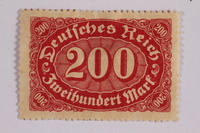
Postage stamp, 200 mark, issued in Germany during hyperinflation in the Weimar Republic
Object
German postage stamp for 200 marks acquired by Ross Baker in prewar Vienna, Austria. It is an example of the hyperinflation of the Weimar Republic of Germany from about 1915-1924. Ross was a chemist and professor at the City University of New York. In 1937, he received a sabbatical leave to study at the University of Vienna and moved there with his wife and five sons. During this time, the family witnessed many historic events, such as the Anschluss and its aftermath in Vienna, visits by Hitler and other German officials, and the defacement and boycotting of Jewish businesses. On March 12, 1938, German troops marched into Vienna and, the next day, Austria was incorporated into Nazi Germany. The German enacted anti-Jewish laws immediately. On April 10, there was a popular vote on the merger and 99% of the population voted Yes in support of Hitler as Fuhrer. Jews were among those who had already been stripped of their rights as citizens, including the right to vote.

Postage stamp, 200 mark, issued in Germany during hyperinflation in the Weimar Republic
Object
German postage stamp for 200 marks acquired by Ross Baker in prewar Vienna, Austria. It is an example of the hyperinflation of the Weimar Republic of Germany from about 1915-1924. Ross was a chemist and professor at the City University of New York. In 1937, he received a sabbatical leave to study at the University of Vienna and moved there with his wife and five sons. During this time, the family witnessed many historic events, such as the Anschluss and its aftermath in Vienna, visits by Hitler and other German officials, and the defacement and boycotting of Jewish businesses. On March 12, 1938, German troops marched into Vienna and, the next day, Austria was incorporated into Nazi Germany. The German enacted anti-Jewish laws immediately. On April 10, there was a popular vote on the merger and 99% of the population voted Yes in support of Hitler as Fuhrer. Jews were among those who had already been stripped of their rights as citizens, including the right to vote.
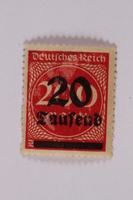
Postage stamp, 200 mark, issued in Germany during hyperinflation in the Weimar Republic
Object
German postage stamp for 200 marks acquired by Ross Baker in prewar Vienna, Austria. It is an example of the hyperinflation of the Weimar Republic of Germany from about 1915-1924. Ross was a chemist and professor at the City University of New York. In 1937, he received a sabbatical leave to study at the University of Vienna and moved there with his wife and five sons. During this time, the family witnessed many historic events, such as the Anschluss and its aftermath in Vienna, visits by Hitler and other German officials, and the defacement and boycotting of Jewish businesses. On March 12, 1938, German troops marched into Vienna and, the next day, Austria was incorporated into Nazi Germany. The German enacted anti-Jewish laws immediately. On April 10, there was a popular vote on the merger and 99% of the population voted Yes in support of Hitler as Fuhrer. Jews were among those who had already been stripped of their rights as citizens, including the right to vote.
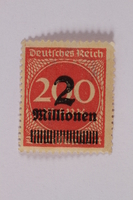
Postage stamp, 200 mark, issued in Germany during hyperinflation in the Weimar Republic
Object
German postage stamp for 200 marks acquired by Ross Baker in prewar Vienna, Austria. It is an example of the hyperinflation of the Weimar Republic of Germany from about 1915-1924. Ross was a chemist and professor at the City University of New York. In 1937, he received a sabbatical leave to study at the University of Vienna and moved there with his wife and five sons. During this time, the family witnessed many historic events, such as the Anschluss and its aftermath in Vienna, visits by Hitler and other German officials, and the defacement and boycotting of Jewish businesses. On March 12, 1938, German troops marched into Vienna and, the next day, Austria was incorporated into Nazi Germany. The German enacted anti-Jewish laws immediately. On April 10, there was a popular vote on the merger and 99% of the population voted Yes in support of Hitler as Fuhrer. Jews were among those who had already been stripped of their rights as citizens, including the right to vote.
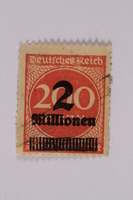
Postage stamp, 200 mark, issued in Germany during hyperinflation in the Weimar Republic
Object
German postage stamp for 200 marks acquired by Ross Baker in prewar Vienna, Austria. It is an example of the hyperinflation of the Weimar Republic of Germany from about 1915-1924. Ross was a chemist and professor at the City University of New York. In 1937, he received a sabbatical leave to study at the University of Vienna and moved there with his wife and five sons. During this time, the family witnessed many historic events, such as the Anschluss and its aftermath in Vienna, visits by Hitler and other German officials, and the defacement and boycotting of Jewish businesses. On March 12, 1938, German troops marched into Vienna and, the next day, Austria was incorporated into Nazi Germany. The German enacted anti-Jewish laws immediately. On April 10, there was a popular vote on the merger and 99% of the population voted Yes in support of Hitler as Fuhrer. Jews were among those who had already been stripped of their rights as citizens, including the right to vote.
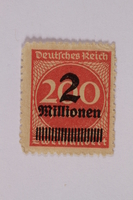
Postage stamp, 200 mark, issued in Germany during hyperinflation in the Weimar Republic
Object
German postage stamp for 200 marks acquired by Ross Baker in prewar Vienna, Austria. It is an example of the hyperinflation of the Weimar Republic of Germany from about 1915-1924. Ross was a chemist and professor at the City University of New York. In 1937, he received a sabbatical leave to study at the University of Vienna and moved there with his wife and five sons. During this time, the family witnessed many historic events, such as the Anschluss and its aftermath in Vienna, visits by Hitler and other German officials, and the defacement and boycotting of Jewish businesses. On March 12, 1938, German troops marched into Vienna and, the next day, Austria was incorporated into Nazi Germany. The German enacted anti-Jewish laws immediately. On April 10, there was a popular vote on the merger and 99% of the population voted Yes in support of Hitler as Fuhrer. Jews were among those who had already been stripped of their rights as citizens, including the right to vote.
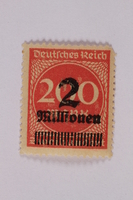
Postage stamp, 200 mark, issued in Germany during hyperinflation in the Weimar Republic
Object
German postage stamp for 200 marks acquired by Ross Baker in prewar Vienna, Austria. It is an example of the hyperinflation of the Weimar Republic of Germany from about 1915-1924. Ross was a chemist and professor at the City University of New York. In 1937, he received a sabbatical leave to study at the University of Vienna and moved there with his wife and five sons. During this time, the family witnessed many historic events, such as the Anschluss and its aftermath in Vienna, visits by Hitler and other German officials, and the defacement and boycotting of Jewish businesses. On March 12, 1938, German troops marched into Vienna and, the next day, Austria was incorporated into Nazi Germany. The German enacted anti-Jewish laws immediately. On April 10, there was a popular vote on the merger and 99% of the population voted Yes in support of Hitler as Fuhrer. Jews were among those who had already been stripped of their rights as citizens, including the right to vote.
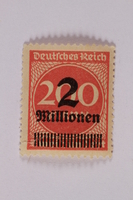
Postage stamp, 200 mark, issued in Germany during hyperinflation in the Weimar Republic
Object
German postage stamp for 200 marks acquired by Ross Baker in prewar Vienna, Austria. It is an example of the hyperinflation of the Weimar Republic of Germany from about 1915-1924. Ross was a chemist and professor at the City University of New York. In 1937, he received a sabbatical leave to study at the University of Vienna and moved there with his wife and five sons. During this time, the family witnessed many historic events, such as the Anschluss and its aftermath in Vienna, visits by Hitler and other German officials, and the defacement and boycotting of Jewish businesses. On March 12, 1938, German troops marched into Vienna and, the next day, Austria was incorporated into Nazi Germany. The German enacted anti-Jewish laws immediately. On April 10, there was a popular vote on the merger and 99% of the population voted Yes in support of Hitler as Fuhrer. Jews were among those who had already been stripped of their rights as citizens, including the right to vote.

Postage stamp, 200 mark, issued in Germany during hyperinflation in the Weimar Republic
Object
German postage stamp for 200 marks acquired by Ross Baker in prewar Vienna, Austria. It is an example of the hyperinflation of the Weimar Republic of Germany from about 1915-1924. Ross was a chemist and professor at the City University of New York. In 1937, he received a sabbatical leave to study at the University of Vienna and moved there with his wife and five sons. During this time, the family witnessed many historic events, such as the Anschluss and its aftermath in Vienna, visits by Hitler and other German officials, and the defacement and boycotting of Jewish businesses. On March 12, 1938, German troops marched into Vienna and, the next day, Austria was incorporated into Nazi Germany. The German enacted anti-Jewish laws immediately. On April 10, there was a popular vote on the merger and 99% of the population voted Yes in support of Hitler as Fuhrer. Jews were among those who had already been stripped of their rights as citizens, including the right to vote.

Postage stamp, 200 mark, issued in Germany during hyperinflation in the Weimar Republic
Object
German postage stamp for 200 marks acquired by Ross Baker in prewar Vienna, Austria. It is an example of the hyperinflation of the Weimar Republic of Germany from about 1915-1924. Ross was a chemist and professor at the City University of New York. In 1937, he received a sabbatical leave to study at the University of Vienna and moved there with his wife and five sons. During this time, the family witnessed many historic events, such as the Anschluss and its aftermath in Vienna, visits by Hitler and other German officials, and the defacement and boycotting of Jewish businesses. On March 12, 1938, German troops marched into Vienna and, the next day, Austria was incorporated into Nazi Germany. The German enacted anti-Jewish laws immediately. On April 10, there was a popular vote on the merger and 99% of the population voted Yes in support of Hitler as Fuhrer. Jews were among those who had already been stripped of their rights as citizens, including the right to vote.
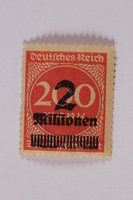
Postage stamp, 200 mark, issued in Germany during hyperinflation in the Weimar Republic
Object
German postage stamp for 200 marks acquired by Ross Baker in prewar Vienna, Austria. It is an example of the hyperinflation of the Weimar Republic of Germany from about 1915-1924. Ross was a chemist and professor at the City University of New York. In 1937, he received a sabbatical leave to study at the University of Vienna and moved there with his wife and five sons. During this time, the family witnessed many historic events, such as the Anschluss and its aftermath in Vienna, visits by Hitler and other German officials, and the defacement and boycotting of Jewish businesses. On March 12, 1938, German troops marched into Vienna and, the next day, Austria was incorporated into Nazi Germany. The German enacted anti-Jewish laws immediately. On April 10, there was a popular vote on the merger and 99% of the population voted Yes in support of Hitler as Fuhrer. Jews were among those who had already been stripped of their rights as citizens, including the right to vote.

Postage stamp, 200 mark, issued in Germany during hyperinflation in the Weimar Republic
Object
German postage stamp for 200 marks acquired by Ross Baker in prewar Vienna, Austria. It is an example of the hyperinflation of the Weimar Republic of Germany from about 1915-1924. Ross was a chemist and professor at the City University of New York. In 1937, he received a sabbatical leave to study at the University of Vienna and moved there with his wife and five sons. During this time, the family witnessed many historic events, such as the Anschluss and its aftermath in Vienna, visits by Hitler and other German officials, and the defacement and boycotting of Jewish businesses. On March 12, 1938, German troops marched into Vienna and, the next day, Austria was incorporated into Nazi Germany. The German enacted anti-Jewish laws immediately. On April 10, there was a popular vote on the merger and 99% of the population voted Yes in support of Hitler as Fuhrer. Jews were among those who had already been stripped of their rights as citizens, including the right to vote.
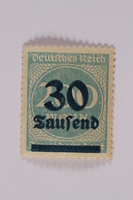
Postage stamp, 200 mark, issued in Germany during hyperinflation in the Weimar Republic
Object
German postage stamp for 200 marks acquired by Ross Baker in prewar Vienna, Austria. It is an example of the hyperinflation of the Weimar Republic of Germany from about 1915-1924. Ross was a chemist and professor at the City University of New York. In 1937, he received a sabbatical leave to study at the University of Vienna and moved there with his wife and five sons. During this time, the family witnessed many historic events, such as the Anschluss and its aftermath in Vienna, visits by Hitler and other German officials, and the defacement and boycotting of Jewish businesses. On March 12, 1938, German troops marched into Vienna and, the next day, Austria was incorporated into Nazi Germany. The German enacted anti-Jewish laws immediately. On April 10, there was a popular vote on the merger and 99% of the population voted Yes in support of Hitler as Fuhrer. Jews were among those who had already been stripped of their rights as citizens, including the right to vote.
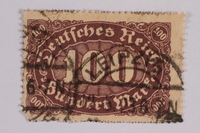
Postage stamp, 100 mark, issued in Germany during hyperinflation in the Weimar Republic
Object
German postage stamp for 100 marks acquired by Ross Baker in prewar Vienna, Austria. It is an example of the hyperinflation of the Weimar Republic of Germany from about 1915-1924. Ross was a chemist and professor at the City University of New York. In 1937, he received a sabbatical leave to study at the University of Vienna and moved there with his wife and five sons. During this time, the family witnessed many historic events, such as the Anschluss and its aftermath in Vienna, visits by Hitler and other German officials, and the defacement and boycotting of Jewish businesses. On March 12, 1938, German troops marched into Vienna and, the next day, Austria was incorporated into Nazi Germany. The German enacted anti-Jewish laws immediately. On April 10, there was a popular vote on the merger and 99% of the population voted Yes in support of Hitler as Fuhrer. Jews were among those who had already been stripped of their rights as citizens, including the right to vote.
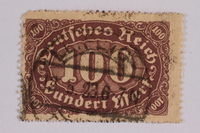
Postage stamp, 100 mark, issued in Germany during hyperinflation in the Weimar Republic
Object
German postage stamp for 100 marks acquired by Ross Baker in prewar Vienna, Austria. It is an example of the hyperinflation of the Weimar Republic of Germany from about 1915-1924. Ross was a chemist and professor at the City University of New York. In 1937, he received a sabbatical leave to study at the University of Vienna and moved there with his wife and five sons. During this time, the family witnessed many historic events, such as the Anschluss and its aftermath in Vienna, visits by Hitler and other German officials, and the defacement and boycotting of Jewish businesses. On March 12, 1938, German troops marched into Vienna and, the next day, Austria was incorporated into Nazi Germany. The German enacted anti-Jewish laws immediately. On April 10, there was a popular vote on the merger and 99% of the population voted Yes in support of Hitler as Fuhrer. Jews were among those who had already been stripped of their rights as citizens, including the right to vote.

Postage stamp, 100 mark, issued in Germany during hyperinflation in the Weimar Republic
Object
German postage stamp for 100 marks acquired by Ross Baker in prewar Vienna, Austria. It is an example of the hyperinflation of the Weimar Republic of Germany from about 1915-1924. Ross was a chemist and professor at the City University of New York. In 1937, he received a sabbatical leave to study at the University of Vienna and moved there with his wife and five sons. During this time, the family witnessed many historic events, such as the Anschluss and its aftermath in Vienna, visits by Hitler and other German officials, and the defacement and boycotting of Jewish businesses. On March 12, 1938, German troops marched into Vienna and, the next day, Austria was incorporated into Nazi Germany. The German enacted anti-Jewish laws immediately. On April 10, there was a popular vote on the merger and 99% of the population voted Yes in support of Hitler as Fuhrer. Jews were among those who had already been stripped of their rights as citizens, including the right to vote.
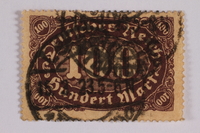
Postage stamp, 100 mark, issued in Germany during hyperinflation in the Weimar Republic
Object
German postage stamp for 100 marks acquired by Ross Baker in prewar Vienna, Austria. It is an example of the hyperinflation of the Weimar Republic of Germany from about 1915-1924. Ross was a chemist and professor at the City University of New York. In 1937, he received a sabbatical leave to study at the University of Vienna and moved there with his wife and five sons. During this time, the family witnessed many historic events, such as the Anschluss and its aftermath in Vienna, visits by Hitler and other German officials, and the defacement and boycotting of Jewish businesses. On March 12, 1938, German troops marched into Vienna and, the next day, Austria was incorporated into Nazi Germany. The German enacted anti-Jewish laws immediately. On April 10, there was a popular vote on the merger and 99% of the population voted Yes in support of Hitler as Fuhrer. Jews were among those who had already been stripped of their rights as citizens, including the right to vote.

Postage stamp, 100 mark, issued in Germany during hyperinflation in the Weimar Republic
Object
German postage stamp for 100 marks acquired by Ross Baker in prewar Vienna, Austria. It is an example of the hyperinflation of the Weimar Republic of Germany from about 1915-1924. Ross was a chemist and professor at the City University of New York. In 1937, he received a sabbatical leave to study at the University of Vienna and moved there with his wife and five sons. During this time, the family witnessed many historic events, such as the Anschluss and its aftermath in Vienna, visits by Hitler and other German officials, and the defacement and boycotting of Jewish businesses. On March 12, 1938, German troops marched into Vienna and, the next day, Austria was incorporated into Nazi Germany. The German enacted anti-Jewish laws immediately. On April 10, there was a popular vote on the merger and 99% of the population voted Yes in support of Hitler as Fuhrer. Jews were among those who had already been stripped of their rights as citizens, including the right to vote.
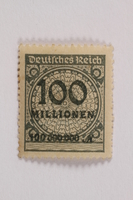
Postage stamp, 100 mark, issued in Germany during hyperinflation in the Weimar Republic
Object
German postage stamp for 100 marks acquired by Ross Baker in prewar Vienna, Austria. It is an example of the hyperinflation of the Weimar Republic of Germany from about 1915-1924. Ross was a chemist and professor at the City University of New York. In 1937, he received a sabbatical leave to study at the University of Vienna and moved there with his wife and five sons. During this time, the family witnessed many historic events, such as the Anschluss and its aftermath in Vienna, visits by Hitler and other German officials, and the defacement and boycotting of Jewish businesses. On March 12, 1938, German troops marched into Vienna and, the next day, Austria was incorporated into Nazi Germany. The German enacted anti-Jewish laws immediately. On April 10, there was a popular vote on the merger and 99% of the population voted Yes in support of Hitler as Fuhrer. Jews were among those who had already been stripped of their rights as citizens, including the right to vote.
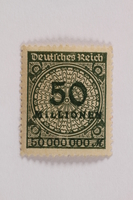
Postage stamp, 50 milionen mark, issued in Germany during hyperinflation in the Weimar Republic
Object
German postage stamp for 50 million marks acquired by Ross Baker in prewar Vienna, Austria. It is an example of the hyperinflation of the Weimar Republic of Germany from about 1915-1924. Ross was a chemist and professor at the City University of New York. In 1937, he received a sabbatical leave to study at the University of Vienna and moved there with his wife and five sons. During this time, the family witnessed many historic events, such as the Anschluss and its aftermath in Vienna, visits by Hitler and other German officials, and the defacement and boycotting of Jewish businesses. On March 12, 1938, German troops marched into Vienna and, the next day, Austria was incorporated into Nazi Germany. The German enacted anti-Jewish laws immediately. On April 10, there was a popular vote on the merger and 99% of the population voted Yes in support of Hitler as Fuhrer. Jews were among those who had already been stripped of their rights as citizens, including the right to vote.
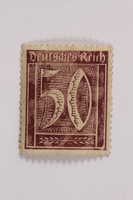
Postage stamp, 50 mark, issued in Germany during hyperinflation in the Weimar Republic
Object
German postage stamp for 50 marks acquired by Ross Baker in prewar Vienna, Austria. It is an example of the hyperinflation of the Weimar Republic of Germany from about 1915-1924. Ross was a chemist and professor at the City University of New York. In 1937, he received a sabbatical leave to study at the University of Vienna and moved there with his wife and five sons. During this time, the family witnessed many historic events, such as the Anschluss and its aftermath in Vienna, visits by Hitler and other German officials, and the defacement and boycotting of Jewish businesses. On March 12, 1938, German troops marched into Vienna and, the next day, Austria was incorporated into Nazi Germany. The German enacted anti-Jewish laws immediately. On April 10, there was a popular vote on the merger and 99% of the population voted Yes in support of Hitler as Fuhrer. Jews were among those who had already been stripped of their rights as citizens, including the right to vote.
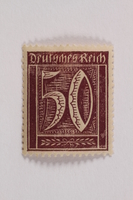
Postage stamp, 50 mark, issued in Germany during hyperinflation in the Weimar Republic
Object
German postage stamp for 50 marks acquired by Ross Baker in prewar Vienna, Austria. It is an example of the hyperinflation of the Weimar Republic of Germany from about 1915-1924. Ross was a chemist and professor at the City University of New York. In 1937, he received a sabbatical leave to study at the University of Vienna and moved there with his wife and five sons. During this time, the family witnessed many historic events, such as the Anschluss and its aftermath in Vienna, visits by Hitler and other German officials, and the defacement and boycotting of Jewish businesses. On March 12, 1938, German troops marched into Vienna and, the next day, Austria was incorporated into Nazi Germany. The German enacted anti-Jewish laws immediately. On April 10, there was a popular vote on the merger and 99% of the population voted Yes in support of Hitler as Fuhrer. Jews were among those who had already been stripped of their rights as citizens, including the right to vote.
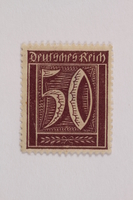
Postage stamp, 50 mark, issued in Germany during hyperinflation in the Weimar Republic
Object
German postage stamp for 50 marks acquired by Ross Baker in prewar Vienna, Austria. It is an example of the hyperinflation of the Weimar Republic of Germany from about 1915-1924. Ross was a chemist and professor at the City University of New York. In 1937, he received a sabbatical leave to study at the University of Vienna and moved there with his wife and five sons. During this time, the family witnessed many historic events, such as the Anschluss and its aftermath in Vienna, visits by Hitler and other German officials, and the defacement and boycotting of Jewish businesses. On March 12, 1938, German troops marched into Vienna and, the next day, Austria was incorporated into Nazi Germany. The German enacted anti-Jewish laws immediately. On April 10, there was a popular vote on the merger and 99% of the population voted Yes in support of Hitler as Fuhrer. Jews were among those who had already been stripped of their rights as citizens, including the right to vote.
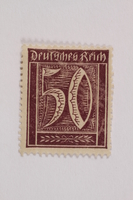
Postage stamp, 50 mark, issued in Germany during hyperinflation in the Weimar Republic
Object
German postage stamp for 50 marks acquired by Ross Baker in prewar Vienna, Austria. It is an example of the hyperinflation of the Weimar Republic of Germany from about 1915-1924. Ross was a chemist and professor at the City University of New York. In 1937, he received a sabbatical leave to study at the University of Vienna and moved there with his wife and five sons. During this time, the family witnessed many historic events, such as the Anschluss and its aftermath in Vienna, visits by Hitler and other German officials, and the defacement and boycotting of Jewish businesses. On March 12, 1938, German troops marched into Vienna and, the next day, Austria was incorporated into Nazi Germany. The German enacted anti-Jewish laws immediately. On April 10, there was a popular vote on the merger and 99% of the population voted Yes in support of Hitler as Fuhrer. Jews were among those who had already been stripped of their rights as citizens, including the right to vote.
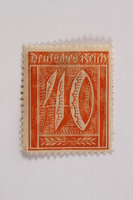
Postage stamp, 40 mark, issued in Germany during hyperinflation in the Weimar Republic
Object
German postage stamp for 40 marks acquired by Ross Baker in prewar Vienna, Austria. It is an example of the hyperinflation of the Weimar Republic of Germany from about 1915-1924. Ross was a chemist and professor at the City University of New York. In 1937, he received a sabbatical leave to study at the University of Vienna and moved there with his wife and five sons. During this time, the family witnessed many historic events, such as the Anschluss and its aftermath in Vienna, visits by Hitler and other German officials, and the defacement and boycotting of Jewish businesses. On March 12, 1938, German troops marched into Vienna and, the next day, Austria was incorporated into Nazi Germany. The German enacted anti-Jewish laws immediately. On April 10, there was a popular vote on the merger and 99% of the population voted Yes in support of Hitler as Fuhrer. Jews were among those who had already been stripped of their rights as citizens, including the right to vote.

Postage stamp, 40 mark, issued in Germany during hyperinflation in the Weimar Republic
Object
German postage stamp for 40 marks acquired by Ross Baker in prewar Vienna, Austria. It is an example of the hyperinflation of the Weimar Republic of Germany from about 1915-1924. Ross was a chemist and professor at the City University of New York. In 1937, he received a sabbatical leave to study at the University of Vienna and moved there with his wife and five sons. During this time, the family witnessed many historic events, such as the Anschluss and its aftermath in Vienna, visits by Hitler and other German officials, and the defacement and boycotting of Jewish businesses. On March 12, 1938, German troops marched into Vienna and, the next day, Austria was incorporated into Nazi Germany. The German enacted anti-Jewish laws immediately. On April 10, there was a popular vote on the merger and 99% of the population voted Yes in support of Hitler as Fuhrer. Jews were among those who had already been stripped of their rights as citizens, including the right to vote.
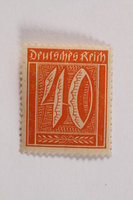
Postage stamp, 40 mark, issued in Germany during hyperinflation in the Weimar Republic
Object
German postage stamp for 40 marks acquired by Ross Baker in prewar Vienna, Austria. It is an example of the hyperinflation of the Weimar Republic of Germany from about 1915-1924. Ross was a chemist and professor at the City University of New York. In 1937, he received a sabbatical leave to study at the University of Vienna and moved there with his wife and five sons. During this time, the family witnessed many historic events, such as the Anschluss and its aftermath in Vienna, visits by Hitler and other German officials, and the defacement and boycotting of Jewish businesses. On March 12, 1938, German troops marched into Vienna and, the next day, Austria was incorporated into Nazi Germany. The German enacted anti-Jewish laws immediately. On April 10, there was a popular vote on the merger and 99% of the population voted Yes in support of Hitler as Fuhrer. Jews were among those who had already been stripped of their rights as citizens, including the right to vote.
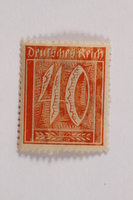
Postage stamp, 40 mark, issued in Germany during hyperinflation in the Weimar Republic
Object
German postage stamp for 40 marks acquired by Ross Baker in prewar Vienna, Austria. It is an example of the hyperinflation of the Weimar Republic of Germany from about 1915-1924. Ross was a chemist and professor at the City University of New York. In 1937, he received a sabbatical leave to study at the University of Vienna and moved there with his wife and five sons. During this time, the family witnessed many historic events, such as the Anschluss and its aftermath in Vienna, visits by Hitler and other German officials, and the defacement and boycotting of Jewish businesses. On March 12, 1938, German troops marched into Vienna and, the next day, Austria was incorporated into Nazi Germany. The German enacted anti-Jewish laws immediately. On April 10, there was a popular vote on the merger and 99% of the population voted Yes in support of Hitler as Fuhrer. Jews were among those who had already been stripped of their rights as citizens, including the right to vote.

Postage stamp, 40 mark, issued in Germany during hyperinflation in the Weimar Republic
Object
German postage stamp for 40 marks acquired by Ross Baker in prewar Vienna, Austria. It is an example of the hyperinflation of the Weimar Republic of Germany from about 1915-1924. Ross was a chemist and professor at the City University of New York. In 1937, he received a sabbatical leave to study at the University of Vienna and moved there with his wife and five sons. During this time, the family witnessed many historic events, such as the Anschluss and its aftermath in Vienna, visits by Hitler and other German officials, and the defacement and boycotting of Jewish businesses. On March 12, 1938, German troops marched into Vienna and, the next day, Austria was incorporated into Nazi Germany. The German enacted anti-Jewish laws immediately. On April 10, there was a popular vote on the merger and 99% of the population voted Yes in support of Hitler as Fuhrer. Jews were among those who had already been stripped of their rights as citizens, including the right to vote.

Postage stamp, 40 mark, issued in Germany during hyperinflation in the Weimar Republic
Object
German postage stamp for 40 marks acquired by Ross Baker in prewar Vienna, Austria. It is an example of the hyperinflation of the Weimar Republic of Germany from about 1915-1924. Ross was a chemist and professor at the City University of New York. In 1937, he received a sabbatical leave to study at the University of Vienna and moved there with his wife and five sons. During this time, the family witnessed many historic events, such as the Anschluss and its aftermath in Vienna, visits by Hitler and other German officials, and the defacement and boycotting of Jewish businesses. On March 12, 1938, German troops marched into Vienna and, the next day, Austria was incorporated into Nazi Germany. The German enacted anti-Jewish laws immediately. On April 10, there was a popular vote on the merger and 99% of the population voted Yes in support of Hitler as Fuhrer. Jews were among those who had already been stripped of their rights as citizens, including the right to vote.
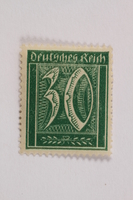
Postage stamp, 30 mark, issued in Germany during hyperinflation in the Weimar Republic
Object
German postage stamp for 30 marks acquired by Ross Baker in prewar Vienna, Austria. It is an example of the hyperinflation of the Weimar Republic of Germany from about 1915-1924. Ross was a chemist and professor at the City University of New York. In 1937, he received a sabbatical leave to study at the University of Vienna and moved there with his wife and five sons. During this time, the family witnessed many historic events, such as the Anschluss and its aftermath in Vienna, visits by Hitler and other German officials, and the defacement and boycotting of Jewish businesses. On March 12, 1938, German troops marched into Vienna and, the next day, Austria was incorporated into Nazi Germany. The German enacted anti-Jewish laws immediately. On April 10, there was a popular vote on the merger and 99% of the population voted Yes in support of Hitler as Fuhrer. Jews were among those who had already been stripped of their rights as citizens, including the right to vote.
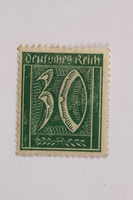
Postage stamp, 30 mark, issued in Germany during hyperinflation in the Weimar Republic
Object
German postage stamp for 30 marks acquired by Ross Baker in prewar Vienna, Austria. It is an example of the hyperinflation of the Weimar Republic of Germany from about 1915-1924. Ross was a chemist and professor at the City University of New York. In 1937, he received a sabbatical leave to study at the University of Vienna and moved there with his wife and five sons. During this time, the family witnessed many historic events, such as the Anschluss and its aftermath in Vienna, visits by Hitler and other German officials, and the defacement and boycotting of Jewish businesses. On March 12, 1938, German troops marched into Vienna and, the next day, Austria was incorporated into Nazi Germany. The German enacted anti-Jewish laws immediately. On April 10, there was a popular vote on the merger and 99% of the population voted Yes in support of Hitler as Fuhrer. Jews were among those who had already been stripped of their rights as citizens, including the right to vote.

Postage stamp, 20 mark, issued in Germany during hyperinflation in the Weimar Republic
Object
German postage stamp for 20 marks acquired by Ross Baker in prewar Vienna, Austria. It is an example of the hyperinflation of the Weimar Republic of Germany from about 1915-1924. Ross was a chemist and professor at the City University of New York. In 1937, he received a sabbatical leave to study at the University of Vienna and moved there with his wife and five sons. During this time, the family witnessed many historic events, such as the Anschluss and its aftermath in Vienna, visits by Hitler and other German officials, and the defacement and boycotting of Jewish businesses. On March 12, 1938, German troops marched into Vienna and, the next day, Austria was incorporated into Nazi Germany. The German enacted anti-Jewish laws immediately. On April 10, there was a popular vote on the merger and 99% of the population voted Yes in support of Hitler as Fuhrer. Jews were among those who had already been stripped of their rights as citizens, including the right to vote.
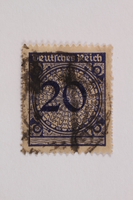
Postage stamp, 20 mark, issued in Germany during hyperinflation in the Weimar Republic
Object
German postage stamp for 20 marks acquired by Ross Baker in prewar Vienna, Austria. It is an example of the hyperinflation of the Weimar Republic of Germany from about 1915-1924. Ross was a chemist and professor at the City University of New York. In 1937, he received a sabbatical leave to study at the University of Vienna and moved there with his wife and five sons. During this time, the family witnessed many historic events, such as the Anschluss and its aftermath in Vienna, visits by Hitler and other German officials, and the defacement and boycotting of Jewish businesses. On March 12, 1938, German troops marched into Vienna and, the next day, Austria was incorporated into Nazi Germany. The German enacted anti-Jewish laws immediately. On April 10, there was a popular vote on the merger and 99% of the population voted Yes in support of Hitler as Fuhrer. Jews were among those who had already been stripped of their rights as citizens, including the right to vote.
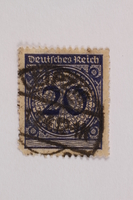
Postage stamp, 20 mark, issued in Germany during hyperinflation in the Weimar Republic
Object
German postage stamp for 20 marks acquired by Ross Baker in prewar Vienna, Austria. It is an example of the hyperinflation of the Weimar Republic of Germany from about 1915-1924. Ross was a chemist and professor at the City University of New York. In 1937, he received a sabbatical leave to study at the University of Vienna and moved there with his wife and five sons. During this time, the family witnessed many historic events, such as the Anschluss and its aftermath in Vienna, visits by Hitler and other German officials, and the defacement and boycotting of Jewish businesses. On March 12, 1938, German troops marched into Vienna and, the next day, Austria was incorporated into Nazi Germany. The German enacted anti-Jewish laws immediately. On April 10, there was a popular vote on the merger and 99% of the population voted Yes in support of Hitler as Fuhrer. Jews were among those who had already been stripped of their rights as citizens, including the right to vote.
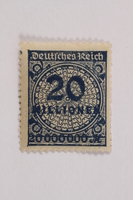
Postage stamp, 20 mark, issued in Germany during hyperinflation in the Weimar Republic
Object
German postage stamp for 20 marks acquired by Ross Baker in prewar Vienna, Austria. It is an example of the hyperinflation of the Weimar Republic of Germany from about 1915-1924. Ross was a chemist and professor at the City University of New York. In 1937, he received a sabbatical leave to study at the University of Vienna and moved there with his wife and five sons. During this time, the family witnessed many historic events, such as the Anschluss and its aftermath in Vienna, visits by Hitler and other German officials, and the defacement and boycotting of Jewish businesses. On March 12, 1938, German troops marched into Vienna and, the next day, Austria was incorporated into Nazi Germany. The German enacted anti-Jewish laws immediately. On April 10, there was a popular vote on the merger and 99% of the population voted Yes in support of Hitler as Fuhrer. Jews were among those who had already been stripped of their rights as citizens, including the right to vote.
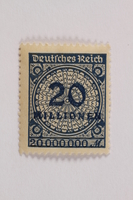
Postage stamp, 20 mark, issued in Germany during hyperinflation in the Weimar Republic
Object
German postage stamp for 20 marks acquired by Ross Baker in prewar Vienna, Austria. It is an example of the hyperinflation of the Weimar Republic of Germany from about 1915-1924. Ross was a chemist and professor at the City University of New York. In 1937, he received a sabbatical leave to study at the University of Vienna and moved there with his wife and five sons. During this time, the family witnessed many historic events, such as the Anschluss and its aftermath in Vienna, visits by Hitler and other German officials, and the defacement and boycotting of Jewish businesses. On March 12, 1938, German troops marched into Vienna and, the next day, Austria was incorporated into Nazi Germany. The German enacted anti-Jewish laws immediately. On April 10, there was a popular vote on the merger and 99% of the population voted Yes in support of Hitler as Fuhrer. Jews were among those who had already been stripped of their rights as citizens, including the right to vote.
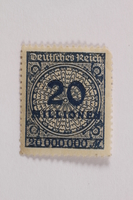
Postage stamp, 20 mark, issued in Germany during hyperinflation in the Weimar Republic
Object
German postage stamp for 20 marks acquired by Ross Baker in prewar Vienna, Austria. It is an example of the hyperinflation of the Weimar Republic of Germany from about 1915-1924. Ross was a chemist and professor at the City University of New York. In 1937, he received a sabbatical leave to study at the University of Vienna and moved there with his wife and five sons. During this time, the family witnessed many historic events, such as the Anschluss and its aftermath in Vienna, visits by Hitler and other German officials, and the defacement and boycotting of Jewish businesses. On March 12, 1938, German troops marched into Vienna and, the next day, Austria was incorporated into Nazi Germany. The German enacted anti-Jewish laws immediately. On April 10, there was a popular vote on the merger and 99% of the population voted Yes in support of Hitler as Fuhrer. Jews were among those who had already been stripped of their rights as citizens, including the right to vote.

Postage stamp, 20 mark, issued in Germany during hyperinflation in the Weimar Republic
Object
German postage stamp for 20 marks acquired by Ross Baker in prewar Vienna, Austria. It is an example of the hyperinflation of the Weimar Republic of Germany from about 1915-1924. Ross was a chemist and professor at the City University of New York. In 1937, he received a sabbatical leave to study at the University of Vienna and moved there with his wife and five sons. During this time, the family witnessed many historic events, such as the Anschluss and its aftermath in Vienna, visits by Hitler and other German officials, and the defacement and boycotting of Jewish businesses. On March 12, 1938, German troops marched into Vienna and, the next day, Austria was incorporated into Nazi Germany. The German enacted anti-Jewish laws immediately. On April 10, there was a popular vote on the merger and 99% of the population voted Yes in support of Hitler as Fuhrer. Jews were among those who had already been stripped of their rights as citizens, including the right to vote.
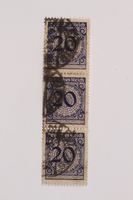
Postage stamp, 20 mark, issued in Germany during hyperinflation in the Weimar Republic
Object
German postage stamp for 20 marks acquired by Ross Baker in prewar Vienna, Austria. It is an example of the hyperinflation of the Weimar Republic of Germany from about 1915-1924. Ross was a chemist and professor at the City University of New York. In 1937, he received a sabbatical leave to study at the University of Vienna and moved there with his wife and five sons. During this time, the family witnessed many historic events, such as the Anschluss and its aftermath in Vienna, visits by Hitler and other German officials, and the defacement and boycotting of Jewish businesses. On March 12, 1938, German troops marched into Vienna and, the next day, Austria was incorporated into Nazi Germany. The German enacted anti-Jewish laws immediately. On April 10, there was a popular vote on the merger and 99% of the population voted Yes in support of Hitler as Fuhrer. Jews were among those who had already been stripped of their rights as citizens, including the right to vote.
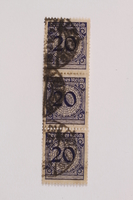
Postage stamp, 20 mark, issued in Germany during hyperinflation in the Weimar Republic
Object
German postage stamp for 20 marks acquired by Ross Baker in prewar Vienna, Austria. It is an example of the hyperinflation of the Weimar Republic of Germany from about 1915-1924. Ross was a chemist and professor at the City University of New York. In 1937, he received a sabbatical leave to study at the University of Vienna and moved there with his wife and five sons. During this time, the family witnessed many historic events, such as the Anschluss and its aftermath in Vienna, visits by Hitler and other German officials, and the defacement and boycotting of Jewish businesses. On March 12, 1938, German troops marched into Vienna and, the next day, Austria was incorporated into Nazi Germany. The German enacted anti-Jewish laws immediately. On April 10, there was a popular vote on the merger and 99% of the population voted Yes in support of Hitler as Fuhrer. Jews were among those who had already been stripped of their rights as citizens, including the right to vote.
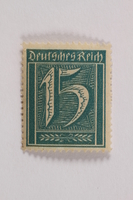
Postage stamp, 15 mark, issued in Germany during hyperinflation in the Weimar Republic
Object
German postage stamp for 15 marks acquired by Ross Baker in prewar Vienna, Austria. It is an example of the hyperinflation of the Weimar Republic of Germany from about 1915-1924. Ross was a chemist and professor at the City University of New York. In 1937, he received a sabbatical leave to study at the University of Vienna and moved there with his wife and five sons. During this time, the family witnessed many historic events, such as the Anschluss and its aftermath in Vienna, visits by Hitler and other German officials, and the defacement and boycotting of Jewish businesses. On March 12, 1938, German troops marched into Vienna and, the next day, Austria was incorporated into Nazi Germany. The German enacted anti-Jewish laws immediately. On April 10, there was a popular vote on the merger and 99% of the population voted Yes in support of Hitler as Fuhrer. Jews were among those who had already been stripped of their rights as citizens, including the right to vote.
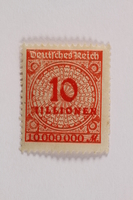
Postage stamp, 10 mark, issued in Germany during hyperinflation in the Weimar Republic
Object
German postage stamp for 10 marks acquired by Ross Baker in prewar Vienna, Austria. It is an example of the hyperinflation of the Weimar Republic of Germany from about 1915-1924. Ross was a chemist and professor at the City University of New York. In 1937, he received a sabbatical leave to study at the University of Vienna and moved there with his wife and five sons. During this time, the family witnessed many historic events, such as the Anschluss and its aftermath in Vienna, visits by Hitler and other German officials, and the defacement and boycotting of Jewish businesses. On March 12, 1938, German troops marched into Vienna and, the next day, Austria was incorporated into Nazi Germany. The German enacted anti-Jewish laws immediately. On April 10, there was a popular vote on the merger and 99% of the population voted Yes in support of Hitler as Fuhrer. Jews were among those who had already been stripped of their rights as citizens, including the right to vote.
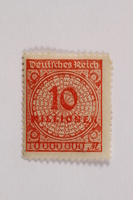
Postage stamp, 10 mark, issued in Germany during hyperinflation in the Weimar Republic
Object
German postage stamp for 10 marks acquired by Ross Baker in prewar Vienna, Austria. It is an example of the hyperinflation of the Weimar Republic of Germany from about 1915-1924. Ross was a chemist and professor at the City University of New York. In 1937, he received a sabbatical leave to study at the University of Vienna and moved there with his wife and five sons. During this time, the family witnessed many historic events, such as the Anschluss and its aftermath in Vienna, visits by Hitler and other German officials, and the defacement and boycotting of Jewish businesses. On March 12, 1938, German troops marched into Vienna and, the next day, Austria was incorporated into Nazi Germany. The German enacted anti-Jewish laws immediately. On April 10, there was a popular vote on the merger and 99% of the population voted Yes in support of Hitler as Fuhrer. Jews were among those who had already been stripped of their rights as citizens, including the right to vote.
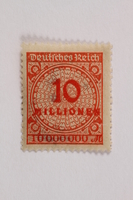
Postage stamp, 10 mark, issued in Germany during hyperinflation in the Weimar Republic
Object
German postage stamp for 10 marks acquired by Ross Baker in prewar Vienna, Austria. It is an example of the hyperinflation of the Weimar Republic of Germany from about 1915-1924. Ross was a chemist and professor at the City University of New York. In 1937, he received a sabbatical leave to study at the University of Vienna and moved there with his wife and five sons. During this time, the family witnessed many historic events, such as the Anschluss and its aftermath in Vienna, visits by Hitler and other German officials, and the defacement and boycotting of Jewish businesses. On March 12, 1938, German troops marched into Vienna and, the next day, Austria was incorporated into Nazi Germany. The German enacted anti-Jewish laws immediately. On April 10, there was a popular vote on the merger and 99% of the population voted Yes in support of Hitler as Fuhrer. Jews were among those who had already been stripped of their rights as citizens, including the right to vote.
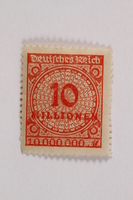
Postage stamp, 10 mark, issued in Germany during hyperinflation in the Weimar Republic
Object
German postage stamp for 10 marks acquired by Ross Baker in prewar Vienna, Austria. It is an example of the hyperinflation of the Weimar Republic of Germany from about 1915-1924. Ross was a chemist and professor at the City University of New York. In 1937, he received a sabbatical leave to study at the University of Vienna and moved there with his wife and five sons. During this time, the family witnessed many historic events, such as the Anschluss and its aftermath in Vienna, visits by Hitler and other German officials, and the defacement and boycotting of Jewish businesses. On March 12, 1938, German troops marched into Vienna and, the next day, Austria was incorporated into Nazi Germany. The German enacted anti-Jewish laws immediately. On April 10, there was a popular vote on the merger and 99% of the population voted Yes in support of Hitler as Fuhrer. Jews were among those who had already been stripped of their rights as citizens, including the right to vote.
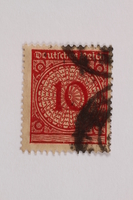
Postage stamp, 10 mark, issued in Germany during hyperinflation in the Weimar Republic
Object
German postage stamp for 10 marks acquired by Ross Baker in prewar Vienna, Austria. It is an example of the hyperinflation of the Weimar Republic of Germany from about 1915-1924. Ross was a chemist and professor at the City University of New York. In 1937, he received a sabbatical leave to study at the University of Vienna and moved there with his wife and five sons. During this time, the family witnessed many historic events, such as the Anschluss and its aftermath in Vienna, visits by Hitler and other German officials, and the defacement and boycotting of Jewish businesses. On March 12, 1938, German troops marched into Vienna and, the next day, Austria was incorporated into Nazi Germany. The German enacted anti-Jewish laws immediately. On April 10, there was a popular vote on the merger and 99% of the population voted Yes in support of Hitler as Fuhrer. Jews were among those who had already been stripped of their rights as citizens, including the right to vote.
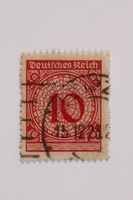
Postage stamp, 10 mark, issued in Germany during hyperinflation in the Weimar Republic
Object
German postage stamp for 10 marks acquired by Ross Baker in prewar Vienna, Austria. It is an example of the hyperinflation of the Weimar Republic of Germany from about 1915-1924. Ross was a chemist and professor at the City University of New York. In 1937, he received a sabbatical leave to study at the University of Vienna and moved there with his wife and five sons. During this time, the family witnessed many historic events, such as the Anschluss and its aftermath in Vienna, visits by Hitler and other German officials, and the defacement and boycotting of Jewish businesses. On March 12, 1938, German troops marched into Vienna and, the next day, Austria was incorporated into Nazi Germany. The German enacted anti-Jewish laws immediately. On April 10, there was a popular vote on the merger and 99% of the population voted Yes in support of Hitler as Fuhrer. Jews were among those who had already been stripped of their rights as citizens, including the right to vote.
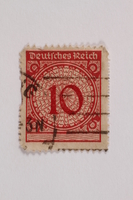
Postage stamp, 10 mark, issued in Germany during hyperinflation in the Weimar Republic
Object
German postage stamp for 10 marks acquired by Ross Baker in prewar Vienna, Austria. It is an example of the hyperinflation of the Weimar Republic of Germany from about 1915-1924. Ross was a chemist and professor at the City University of New York. In 1937, he received a sabbatical leave to study at the University of Vienna and moved there with his wife and five sons. During this time, the family witnessed many historic events, such as the Anschluss and its aftermath in Vienna, visits by Hitler and other German officials, and the defacement and boycotting of Jewish businesses. On March 12, 1938, German troops marched into Vienna and, the next day, Austria was incorporated into Nazi Germany. The German enacted anti-Jewish laws immediately. On April 10, there was a popular vote on the merger and 99% of the population voted Yes in support of Hitler as Fuhrer. Jews were among those who had already been stripped of their rights as citizens, including the right to vote.
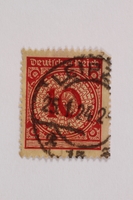
Postage stamp, 10 mark, issued in Germany during hyperinflation in the Weimar Republic
Object
German postage stamp for 10 marks acquired by Ross Baker in prewar Vienna, Austria. It is an example of the hyperinflation of the Weimar Republic of Germany from about 1915-1924. Ross was a chemist and professor at the City University of New York. In 1937, he received a sabbatical leave to study at the University of Vienna and moved there with his wife and five sons. During this time, the family witnessed many historic events, such as the Anschluss and its aftermath in Vienna, visits by Hitler and other German officials, and the defacement and boycotting of Jewish businesses. On March 12, 1938, German troops marched into Vienna and, the next day, Austria was incorporated into Nazi Germany. The German enacted anti-Jewish laws immediately. On April 10, there was a popular vote on the merger and 99% of the population voted Yes in support of Hitler as Fuhrer. Jews were among those who had already been stripped of their rights as citizens, including the right to vote.
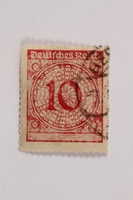
Postage stamp, 10 mark, issued in Germany during hyperinflation in the Weimar Republic
Object
German postage stamp for 10 marks acquired by Ross Baker in prewar Vienna, Austria. It is an example of the hyperinflation of the Weimar Republic of Germany from about 1915-1924. Ross was a chemist and professor at the City University of New York. In 1937, he received a sabbatical leave to study at the University of Vienna and moved there with his wife and five sons. During this time, the family witnessed many historic events, such as the Anschluss and its aftermath in Vienna, visits by Hitler and other German officials, and the defacement and boycotting of Jewish businesses. On March 12, 1938, German troops marched into Vienna and, the next day, Austria was incorporated into Nazi Germany. The German enacted anti-Jewish laws immediately. On April 10, there was a popular vote on the merger and 99% of the population voted Yes in support of Hitler as Fuhrer. Jews were among those who had already been stripped of their rights as citizens, including the right to vote.

Postage stamp, 10 mark, issued in Germany during hyperinflation in the Weimar Republic
Object
German postage stamp for 10 marks acquired by Ross Baker in prewar Vienna, Austria. It is an example of the hyperinflation of the Weimar Republic of Germany from about 1915-1924. Ross was a chemist and professor at the City University of New York. In 1937, he received a sabbatical leave to study at the University of Vienna and moved there with his wife and five sons. During this time, the family witnessed many historic events, such as the Anschluss and its aftermath in Vienna, visits by Hitler and other German officials, and the defacement and boycotting of Jewish businesses. On March 12, 1938, German troops marched into Vienna and, the next day, Austria was incorporated into Nazi Germany. The German enacted anti-Jewish laws immediately. On April 10, there was a popular vote on the merger and 99% of the population voted Yes in support of Hitler as Fuhrer. Jews were among those who had already been stripped of their rights as citizens, including the right to vote.
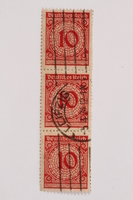
Postage stamp, 10 mark, issued in Germany during hyperinflation in the Weimar Republic
Object
German postage stamp for 10 marks acquired by Ross Baker in prewar Vienna, Austria. It is an example of the hyperinflation of the Weimar Republic of Germany from about 1915-1924. Ross was a chemist and professor at the City University of New York. In 1937, he received a sabbatical leave to study at the University of Vienna and moved there with his wife and five sons. During this time, the family witnessed many historic events, such as the Anschluss and its aftermath in Vienna, visits by Hitler and other German officials, and the defacement and boycotting of Jewish businesses. On March 12, 1938, German troops marched into Vienna and, the next day, Austria was incorporated into Nazi Germany. The German enacted anti-Jewish laws immediately. On April 10, there was a popular vote on the merger and 99% of the population voted Yes in support of Hitler as Fuhrer. Jews were among those who had already been stripped of their rights as citizens, including the right to vote.
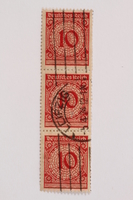
Postage stamp, 10 mark, issued in Germany during hyperinflation in the Weimar Republic
Object
German postage stamp for 10 marks acquired by Ross Baker in prewar Vienna, Austria. It is an example of the hyperinflation of the Weimar Republic of Germany from about 1915-1924. Ross was a chemist and professor at the City University of New York. In 1937, he received a sabbatical leave to study at the University of Vienna and moved there with his wife and five sons. During this time, the family witnessed many historic events, such as the Anschluss and its aftermath in Vienna, visits by Hitler and other German officials, and the defacement and boycotting of Jewish businesses. On March 12, 1938, German troops marched into Vienna and, the next day, Austria was incorporated into Nazi Germany. The German enacted anti-Jewish laws immediately. On April 10, there was a popular vote on the merger and 99% of the population voted Yes in support of Hitler as Fuhrer. Jews were among those who had already been stripped of their rights as citizens, including the right to vote.
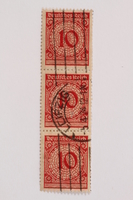
Postage stamp, 10 mark, issued in Germany during hyperinflation in the Weimar Republic
Object
German postage stamp for 10 marks acquired by Ross Baker in prewar Vienna, Austria. It is an example of the hyperinflation of the Weimar Republic of Germany from about 1915-1924. Ross was a chemist and professor at the City University of New York. In 1937, he received a sabbatical leave to study at the University of Vienna and moved there with his wife and five sons. During this time, the family witnessed many historic events, such as the Anschluss and its aftermath in Vienna, visits by Hitler and other German officials, and the defacement and boycotting of Jewish businesses. On March 12, 1938, German troops marched into Vienna and, the next day, Austria was incorporated into Nazi Germany. The German enacted anti-Jewish laws immediately. On April 10, there was a popular vote on the merger and 99% of the population voted Yes in support of Hitler as Fuhrer. Jews were among those who had already been stripped of their rights as citizens, including the right to vote.
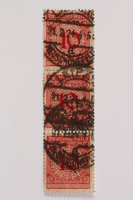
Postage stamp, 10 mark, issued in Germany during hyperinflation in the Weimar Republic
Object
German postage stamp for 10 marks acquired by Ross Baker in prewar Vienna, Austria. It is an example of the hyperinflation of the Weimar Republic of Germany from about 1915-1924. Ross was a chemist and professor at the City University of New York. In 1937, he received a sabbatical leave to study at the University of Vienna and moved there with his wife and five sons. During this time, the family witnessed many historic events, such as the Anschluss and its aftermath in Vienna, visits by Hitler and other German officials, and the defacement and boycotting of Jewish businesses. On March 12, 1938, German troops marched into Vienna and, the next day, Austria was incorporated into Nazi Germany. The German enacted anti-Jewish laws immediately. On April 10, there was a popular vote on the merger and 99% of the population voted Yes in support of Hitler as Fuhrer. Jews were among those who had already been stripped of their rights as citizens, including the right to vote.
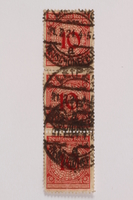
Postage stamp, 10 mark, issued in Germany during hyperinflation in the Weimar Republic
Object
German postage stamp for 10 marks acquired by Ross Baker in prewar Vienna, Austria. It is an example of the hyperinflation of the Weimar Republic of Germany from about 1915-1924. Ross was a chemist and professor at the City University of New York. In 1937, he received a sabbatical leave to study at the University of Vienna and moved there with his wife and five sons. During this time, the family witnessed many historic events, such as the Anschluss and its aftermath in Vienna, visits by Hitler and other German officials, and the defacement and boycotting of Jewish businesses. On March 12, 1938, German troops marched into Vienna and, the next day, Austria was incorporated into Nazi Germany. The German enacted anti-Jewish laws immediately. On April 10, there was a popular vote on the merger and 99% of the population voted Yes in support of Hitler as Fuhrer. Jews were among those who had already been stripped of their rights as citizens, including the right to vote.
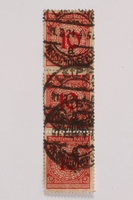
Postage stamp, 10 mark, issued in Germany during hyperinflation in the Weimar Republic
Object
German postage stamp for 10 marks acquired by Ross Baker in prewar Vienna, Austria. It is an example of the hyperinflation of the Weimar Republic of Germany from about 1915-1924. Ross was a chemist and professor at the City University of New York. In 1937, he received a sabbatical leave to study at the University of Vienna and moved there with his wife and five sons. During this time, the family witnessed many historic events, such as the Anschluss and its aftermath in Vienna, visits by Hitler and other German officials, and the defacement and boycotting of Jewish businesses. On March 12, 1938, German troops marched into Vienna and, the next day, Austria was incorporated into Nazi Germany. The German enacted anti-Jewish laws immediately. On April 10, there was a popular vote on the merger and 99% of the population voted Yes in support of Hitler as Fuhrer. Jews were among those who had already been stripped of their rights as citizens, including the right to vote.

Postage stamp, 10 milliarden mark, issued in Germany during hyperinflation in the Weimar Republic
Object
German postage stamp for 10 milliarden marks acquired by Ross Baker in prewar Vienna, Austria. It is an example of the hyperinflation of the Weimar Republic of Germany from about 1915-1924. Ross was a chemist and professor at the City University of New York. In 1937, he received a sabbatical leave to study at the University of Vienna and moved there with his wife and five sons. During this time, the family witnessed many historic events, such as the Anschluss and its aftermath in Vienna, visits by Hitler and other German officials, and the defacement and boycotting of Jewish businesses. On March 12, 1938, German troops marched into Vienna and, the next day, Austria was incorporated into Nazi Germany. The German enacted anti-Jewish laws immediately. On April 10, there was a popular vote on the merger and 99% of the population voted Yes in support of Hitler as Fuhrer. Jews were among those who had already been stripped of their rights as citizens, including the right to vote.

Postage stamp, 5 tausend, issued in Germany during hyperinflation in the Weimar Republic
Object
German postage stamp for 5 tausend acquired by Ross Baker in prewar Vienna, Austria. It is an example of the hyperinflation of the Weimar Republic of Germany from about 1915-1924. Ross was a chemist and professor at the City University of New York. In 1937, he received a sabbatical leave to study at the University of Vienna and moved there with his wife and five sons. During this time, the family witnessed many historic events, such as the Anschluss and its aftermath in Vienna, visits by Hitler and other German officials, and the defacement and boycotting of Jewish businesses. On March 12, 1938, German troops marched into Vienna and, the next day, Austria was incorporated into Nazi Germany. The German enacted anti-Jewish laws immediately. On April 10, there was a popular vote on the merger and 99% of the population voted Yes in support of Hitler as Fuhrer. Jews were among those who had already been stripped of their rights as citizens, including the right to vote.

Postage stamp, 5 millionen, issued in Germany during hyperinflation in the Weimar Republic
Object
German postage stamp for 5 millionen acquired by Ross Baker in prewar Vienna, Austria. It is an example of the hyperinflation of the Weimar Republic of Germany from about 1915-1924. Ross was a chemist and professor at the City University of New York. In 1937, he received a sabbatical leave to study at the University of Vienna and moved there with his wife and five sons. During this time, the family witnessed many historic events, such as the Anschluss and its aftermath in Vienna, visits by Hitler and other German officials, and the defacement and boycotting of Jewish businesses. On March 12, 1938, German troops marched into Vienna and, the next day, Austria was incorporated into Nazi Germany. The German enacted anti-Jewish laws immediately. On April 10, there was a popular vote on the merger and 99% of the population voted Yes in support of Hitler as Fuhrer. Jews were among those who had already been stripped of their rights as citizens, including the right to vote.
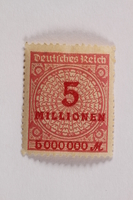
Postage stamp, 5 millionen mark, issued in Germany during hyperinflation in the Weimar Republic
Object
German postage stamp for 5 millionen mark acquired by Ross Baker in prewar Vienna, Austria. It is an example of the hyperinflation of the Weimar Republic of Germany from about 1915-1924. Ross was a chemist and professor at the City University of New York. In 1937, he received a sabbatical leave to study at the University of Vienna and moved there with his wife and five sons. During this time, the family witnessed many historic events, such as the Anschluss and its aftermath in Vienna, visits by Hitler and other German officials, and the defacement and boycotting of Jewish businesses. On March 12, 1938, German troops marched into Vienna and, the next day, Austria was incorporated into Nazi Germany. The German enacted anti-Jewish laws immediately. On April 10, there was a popular vote on the merger and 99% of the population voted Yes in support of Hitler as Fuhrer. Jews were among those who had already been stripped of their rights as citizens, including the right to vote.
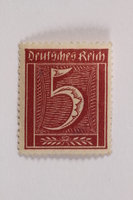
Postage stamp, 5 mark, issued in Germany during hyperinflation in the Weimar Republic
Object
German postage stamp for 5 mark acquired by Ross Baker in prewar Vienna, Austria. It is an example of the hyperinflation of the Weimar Republic of Germany from about 1915-1924. Ross was a chemist and professor at the City University of New York. In 1937, he received a sabbatical leave to study at the University of Vienna and moved there with his wife and five sons. During this time, the family witnessed many historic events, such as the Anschluss and its aftermath in Vienna, visits by Hitler and other German officials, and the defacement and boycotting of Jewish businesses. On March 12, 1938, German troops marched into Vienna and, the next day, Austria was incorporated into Nazi Germany. The German enacted anti-Jewish laws immediately. On April 10, there was a popular vote on the merger and 99% of the population voted Yes in support of Hitler as Fuhrer. Jews were among those who had already been stripped of their rights as citizens, including the right to vote.
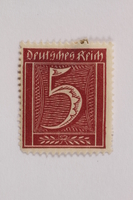
Postage stamp, 5 mark, issued in Germany during hyperinflation in the Weimar Republic
Object
German postage stamp for 5 mark acquired by Ross Baker in prewar Vienna, Austria. It is an example of the hyperinflation of the Weimar Republic of Germany from about 1915-1924. Ross was a chemist and professor at the City University of New York. In 1937, he received a sabbatical leave to study at the University of Vienna and moved there with his wife and five sons. During this time, the family witnessed many historic events, such as the Anschluss and its aftermath in Vienna, visits by Hitler and other German officials, and the defacement and boycotting of Jewish businesses. On March 12, 1938, German troops marched into Vienna and, the next day, Austria was incorporated into Nazi Germany. The German enacted anti-Jewish laws immediately. On April 10, there was a popular vote on the merger and 99% of the population voted Yes in support of Hitler as Fuhrer. Jews were among those who had already been stripped of their rights as citizens, including the right to vote.
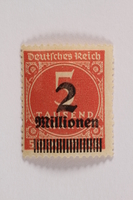
Postage stamp, 5 tausend mark, issued in Germany during hyperinflation in the Weimar Republic
Object
German postage stamp for 5 tausend mark acquired by Ross Baker in prewar Vienna, Austria. It is an example of the hyperinflation of the Weimar Republic of Germany from about 1915-1924. Ross was a chemist and professor at the City University of New York. In 1937, he received a sabbatical leave to study at the University of Vienna and moved there with his wife and five sons. During this time, the family witnessed many historic events, such as the Anschluss and its aftermath in Vienna, visits by Hitler and other German officials, and the defacement and boycotting of Jewish businesses. On March 12, 1938, German troops marched into Vienna and, the next day, Austria was incorporated into Nazi Germany. The German enacted anti-Jewish laws immediately. On April 10, there was a popular vote on the merger and 99% of the population voted Yes in support of Hitler as Fuhrer. Jews were among those who had already been stripped of their rights as citizens, including the right to vote.
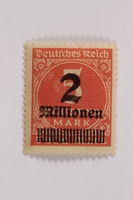
Postage stamp, 5 tausend mark, issued in Germany during hyperinflation in the Weimar Republic
Object
German postage stamp for 5 tausend mark acquired by Ross Baker in prewar Vienna, Austria. It is an example of the hyperinflation of the Weimar Republic of Germany from about 1915-1924. Ross was a chemist and professor at the City University of New York. In 1937, he received a sabbatical leave to study at the University of Vienna and moved there with his wife and five sons. During this time, the family witnessed many historic events, such as the Anschluss and its aftermath in Vienna, visits by Hitler and other German officials, and the defacement and boycotting of Jewish businesses. On March 12, 1938, German troops marched into Vienna and, the next day, Austria was incorporated into Nazi Germany. The German enacted anti-Jewish laws immediately. On April 10, there was a popular vote on the merger and 99% of the population voted Yes in support of Hitler as Fuhrer. Jews were among those who had already been stripped of their rights as citizens, including the right to vote.
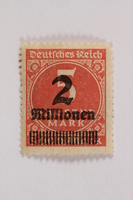
Postage stamp, 5 tausend mark, issued in Germany during hyperinflation in the Weimar Republic
Object
German postage stamp for 5 tausend mark acquired by Ross Baker in prewar Vienna, Austria. It is an example of the hyperinflation of the Weimar Republic of Germany from about 1915-1924. Ross was a chemist and professor at the City University of New York. In 1937, he received a sabbatical leave to study at the University of Vienna and moved there with his wife and five sons. During this time, the family witnessed many historic events, such as the Anschluss and its aftermath in Vienna, visits by Hitler and other German officials, and the defacement and boycotting of Jewish businesses. On March 12, 1938, German troops marched into Vienna and, the next day, Austria was incorporated into Nazi Germany. The German enacted anti-Jewish laws immediately. On April 10, there was a popular vote on the merger and 99% of the population voted Yes in support of Hitler as Fuhrer. Jews were among those who had already been stripped of their rights as citizens, including the right to vote.
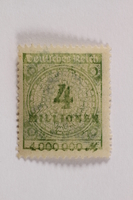
Postage stamp, 4 million mark, issued in Germany during hyperinflation in the Weimar Republic
Object
German postage stamp for 4 million marks acquired by Ross Baker in prewar Vienna, Austria. It is an example of the hyperinflation of the Weimar Republic of Germany from about 1915-1924. Ross was a chemist and professor at the City University of New York. In 1937, he received a sabbatical leave to study at the University of Vienna and moved there with his wife and five sons. During this time, the family witnessed many historic events, such as the Anschluss and its aftermath in Vienna, visits by Hitler and other German officials, and the defacement and boycotting of Jewish businesses. On March 12, 1938, German troops marched into Vienna and, the next day, Austria was incorporated into Nazi Germany. The German enacted anti-Jewish laws immediately. On April 10, there was a popular vote on the merger and 99% of the population voted Yes in support of Hitler as Fuhrer. Jews were among those who had already been stripped of their rights as citizens, including the right to vote.
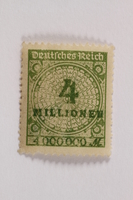
Postage stamp, 4 million mark, issued in Germany during hyperinflation in the Weimar Republic
Object
German postage stamp for 4 million marks acquired by Ross Baker in prewar Vienna, Austria. It is an example of the hyperinflation of the Weimar Republic of Germany from about 1915-1924. Ross was a chemist and professor at the City University of New York. In 1937, he received a sabbatical leave to study at the University of Vienna and moved there with his wife and five sons. During this time, the family witnessed many historic events, such as the Anschluss and its aftermath in Vienna, visits by Hitler and other German officials, and the defacement and boycotting of Jewish businesses. On March 12, 1938, German troops marched into Vienna and, the next day, Austria was incorporated into Nazi Germany. The German enacted anti-Jewish laws immediately. On April 10, there was a popular vote on the merger and 99% of the population voted Yes in support of Hitler as Fuhrer. Jews were among those who had already been stripped of their rights as citizens, including the right to vote.
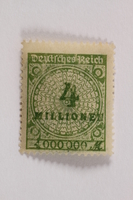
Postage stamp, 4 million mark, issued in Germany during hyperinflation in the Weimar Republic
Object
German postage stamp for 4 million marks acquired by Ross Baker in prewar Vienna, Austria. It is an example of the hyperinflation of the Weimar Republic of Germany from about 1915-1924. Ross was a chemist and professor at the City University of New York. In 1937, he received a sabbatical leave to study at the University of Vienna and moved there with his wife and five sons. During this time, the family witnessed many historic events, such as the Anschluss and its aftermath in Vienna, visits by Hitler and other German officials, and the defacement and boycotting of Jewish businesses. On March 12, 1938, German troops marched into Vienna and, the next day, Austria was incorporated into Nazi Germany. The German enacted anti-Jewish laws immediately. On April 10, there was a popular vote on the merger and 99% of the population voted Yes in support of Hitler as Fuhrer. Jews were among those who had already been stripped of their rights as citizens, including the right to vote.
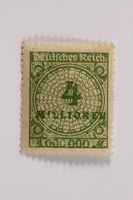
Postage stamp, 4 million mark, issued in Germany during hyperinflation in the Weimar Republic
Object
German postage stamp for 4 million marks acquired by Ross Baker in prewar Vienna, Austria. It is an example of the hyperinflation of the Weimar Republic of Germany from about 1915-1924. Ross was a chemist and professor at the City University of New York. In 1937, he received a sabbatical leave to study at the University of Vienna and moved there with his wife and five sons. During this time, the family witnessed many historic events, such as the Anschluss and its aftermath in Vienna, visits by Hitler and other German officials, and the defacement and boycotting of Jewish businesses. On March 12, 1938, German troops marched into Vienna and, the next day, Austria was incorporated into Nazi Germany. The German enacted anti-Jewish laws immediately. On April 10, there was a popular vote on the merger and 99% of the population voted Yes in support of Hitler as Fuhrer. Jews were among those who had already been stripped of their rights as citizens, including the right to vote.
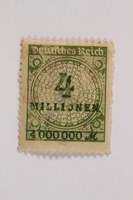
Postage stamp, 4 millionen mark, issued in Germany during hyperinflation in the Weimar Republic
Object
German postage stamp for 4 million marks acquired by Ross Baker in prewar Vienna, Austria. It is an example of the hyperinflation of the Weimar Republic of Germany from about 1915-1924. Ross was a chemist and professor at the City University of New York. In 1937, he received a sabbatical leave to study at the University of Vienna and moved there with his wife and five sons. During this time, the family witnessed many historic events, such as the Anschluss and its aftermath in Vienna, visits by Hitler and other German officials, and the defacement and boycotting of Jewish businesses. On March 12, 1938, German troops marched into Vienna and, the next day, Austria was incorporated into Nazi Germany. The German enacted anti-Jewish laws immediately. On April 10, there was a popular vote on the merger and 99% of the population voted Yes in support of Hitler as Fuhrer. Jews were among those who had already been stripped of their rights as citizens, including the right to vote.
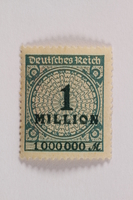
Postage stamp, 1 million mark, issued in Germany during hyperinflation in the Weimar Republic
Object
German postage stamp for 1 million marks acquired by Ross Baker in prewar Vienna, Austria. It is an example of the hyperinflation of the Weimar Republic of Germany from about 1915-1924. Ross was a chemist and professor at the City University of New York. In 1937, he received a sabbatical leave to study at the University of Vienna and moved there with his wife and five sons. During this time, the family witnessed many historic events, such as the Anschluss and its aftermath in Vienna, visits by Hitler and other German officials, and the defacement and boycotting of Jewish businesses. On March 12, 1938, German troops marched into Vienna and, the next day, Austria was incorporated into Nazi Germany. The German enacted anti-Jewish laws immediately. On April 10, there was a popular vote on the merger and 99% of the population voted Yes in support of Hitler as Fuhrer. Jews were among those who had already been stripped of their rights as citizens, including the right to vote.
Ross Baker collection
Document
The collection was gathered by Ross Baker and his family while living in Austria and documents the Anschluss in 1938, the treatment of Jews, and the family’s experiences as a non-Jewish American family living in Vienna in the late 1930s. The collection includes a diary written by Helen Baker; letters written by Baker family members; leaflets, newspapers, and magazines relating to the Anschluss; US Coast Guard photographs of Cherbourg and the invasion at Normandy; liberation photographs of Ebensee; and a document specifying that the Baker family owed no taxes or fees and could leave the country. The green markings throughout the collection were made by Stanley Baker, Ross Baker’s son, when he used the material for presentations and teaching. The Baker family series includes correspondence mainly from Helen to family members including her mother, and between Stanley and his parents, Helen and Ross, as well as a document specifying that the Baker family owed no taxes or fees and can leave the country. The diary, written by Helen Baker in 1933 and from 1937-1938, documents her experience mainly in Austria in 1938. In her entries she writes vividly of the chaos in the streets, the overwhelming amount of propaganda disseminated in the run up to the April vote, the distress of her Jewish acquaintances, and the treatment of Jews. She also writes about visiting the central cemetery in Vienna and seeing the alarming number of new graves in the Jewish section and of her visits to several Jewish shops guarded by Nazis to see if she will be allowed to enter. Printed material was collected by Ross and his family while living in Austria and includes mainly newspapers, clippings, and magazines related to the Anschluss and the war in general. Newspapers and clippings are dated March and April 1938. Leaflets, booklets, and a broadside relate to rallies, calls for donations, and other propaganda. Photographs consist of US Coast Guard photographs of Cherbourg and the invasion at Normandy and an album page which includes liberation photographs of Ebensee and information relating to Stanley’s experience and service in WWII.
Poster announcing mandatory military conscription in Austria
Object
Poster brought back to the US by Ross Baker when he returned from his 1937-1938 sabbatical in Vienna, Austria. The poster declares that military conscription is mandatory in Austria. It was issued just before the Anschluss (merger) with Nazi Germany. Ross was a chemist and professor at the City University of New York. In 1937, he received a sabbatical leave to study at the University of Vienna. He lived there with his wife and five sons from early 1937 until May 1938. On March 13, 1938, Austria was incorporated into Nazi Germany. The Germans enacted anti-Jewish laws immediately. On April 10, there was a vote on the merger and 99% of the population voted Yes in support of Hitler as Fuhrer. Jews were among those who had been stripped of their rights as citizens, including the right to vote.
Handmade Nazi swastika flag with the inscription NUTS acquired by a US family in prewar Vienna
Object
Handmade Nazi flag with swastika and inscription NUTS acquired by Ross Baker in prewar Vienna, Austria. Ross was a chemist and professor at the City University of New York. In 1937, he received a sabbatical leave to study at the University of Vienna and moved there with his wife and five sons. During this time, the family witnessed many historic events, such as the Anschluss and its aftermath in Vienna, visits by Hitler and other German officials, and the defacement and boycotting of Jewish businesses. On March 12, 1938, German troops marched into Vienna and, the next day, Austria was incorporated into Nazi Germany. The German enacted anti-Jewish laws immediately. On April 10, there was a popular vote on the merger and 99% of the population voted Yes in support of Hitler as Fuhrer. Jews were among those who had already been stripped of their rights as citizens, including the right to vote.
Postage stamp, 100 mark, issued in Germany during hyperinflation in the Weimar Republic
Object
German postage stamp for 100 marks acquired by Ross Baker in prewar Vienna, Austria. It is an example of the hyperinflation of the Weimar Republic of Germany from about 1915-1924. Ross was a chemist and professor at the City University of New York. In 1937, he received a sabbatical leave to study at the University of Vienna and moved there with his wife and five sons. During this time, the family witnessed many historic events, such as the Anschluss and its aftermath in Vienna, visits by Hitler and other German officials, and the defacement and boycotting of Jewish businesses. On March 12, 1938, German troops marched into Vienna and, the next day, Austria was incorporated into Nazi Germany. The German enacted anti-Jewish laws immediately. On April 10, there was a popular vote on the merger and 99% of the population voted Yes in support of Hitler as Fuhrer. Jews were among those who had already been stripped of their rights as citizens, including the right to vote.
Postage stamp, 100 mark, issued in Germany during hyperinflation in the Weimar Republic
Object
German postage stamp for 100 marks acquired by Ross Baker in prewar Vienna, Austria. It is an example of the hyperinflation of the Weimar Republic of Germany from about 1915-1924. Ross was a chemist and professor at the City University of New York. In 1937, he received a sabbatical leave to study at the University of Vienna and moved there with his wife and five sons. During this time, the family witnessed many historic events, such as the Anschluss and its aftermath in Vienna, visits by Hitler and other German officials, and the defacement and boycotting of Jewish businesses. On March 12, 1938, German troops marched into Vienna and, the next day, Austria was incorporated into Nazi Germany. The German enacted anti-Jewish laws immediately. On April 10, there was a popular vote on the merger and 99% of the population voted Yes in support of Hitler as Fuhrer. Jews were among those who had already been stripped of their rights as citizens, including the right to vote.
Postage stamp, 100 mark, issued in Germany during hyperinflation in the Weimar Republic
Object
German postage stamp for 100 marks acquired by Ross Baker in prewar Vienna, Austria. It is an example of the hyperinflation of the Weimar Republic of Germany from about 1915-1924. Ross was a chemist and professor at the City University of New York. In 1937, he received a sabbatical leave to study at the University of Vienna and moved there with his wife and five sons. During this time, the family witnessed many historic events, such as the Anschluss and its aftermath in Vienna, visits by Hitler and other German officials, and the defacement and boycotting of Jewish businesses. On March 12, 1938, German troops marched into Vienna and, the next day, Austria was incorporated into Nazi Germany. The German enacted anti-Jewish laws immediately. On April 10, there was a popular vote on the merger and 99% of the population voted Yes in support of Hitler as Fuhrer. Jews were among those who had already been stripped of their rights as citizens, including the right to vote.
Postage stamp, 100 mark, issued in Germany during hyperinflation in the Weimar Republic
Object
German postage stamp for 100 marks acquired by Ross Baker in prewar Vienna, Austria. It is an example of the hyperinflation of the Weimar Republic of Germany from about 1915-1924. Ross was a chemist and professor at the City University of New York. In 1937, he received a sabbatical leave to study at the University of Vienna and moved there with his wife and five sons. During this time, the family witnessed many historic events, such as the Anschluss and its aftermath in Vienna, visits by Hitler and other German officials, and the defacement and boycotting of Jewish businesses. On March 12, 1938, German troops marched into Vienna and, the next day, Austria was incorporated into Nazi Germany. The German enacted anti-Jewish laws immediately. On April 10, there was a popular vote on the merger and 99% of the population voted Yes in support of Hitler as Fuhrer. Jews were among those who had already been stripped of their rights as citizens, including the right to vote.
Postage stamp, 100 mark, issued in Germany during hyperinflation in the Weimar Republic
Object
German postage stamp for 100 marks acquired by Ross Baker in prewar Vienna, Austria. It is an example of the hyperinflation of the Weimar Republic of Germany from about 1915-1924. Ross was a chemist and professor at the City University of New York. In 1937, he received a sabbatical leave to study at the University of Vienna and moved there with his wife and five sons. During this time, the family witnessed many historic events, such as the Anschluss and its aftermath in Vienna, visits by Hitler and other German officials, and the defacement and boycotting of Jewish businesses. On March 12, 1938, German troops marched into Vienna and, the next day, Austria was incorporated into Nazi Germany. The German enacted anti-Jewish laws immediately. On April 10, there was a popular vote on the merger and 99% of the population voted Yes in support of Hitler as Fuhrer. Jews were among those who had already been stripped of their rights as citizens, including the right to vote.
Postage stamp, 100 mark, issued in Germany during hyperinflation in the Weimar Republic
Object
German postage stamp for 100 marks acquired by Ross Baker in prewar Vienna, Austria. It is an example of the hyperinflation of the Weimar Republic of Germany from about 1915-1924. Ross was a chemist and professor at the City University of New York. In 1937, he received a sabbatical leave to study at the University of Vienna and moved there with his wife and five sons. During this time, the family witnessed many historic events, such as the Anschluss and its aftermath in Vienna, visits by Hitler and other German officials, and the defacement and boycotting of Jewish businesses. On March 12, 1938, German troops marched into Vienna and, the next day, Austria was incorporated into Nazi Germany. The German enacted anti-Jewish laws immediately. On April 10, there was a popular vote on the merger and 99% of the population voted Yes in support of Hitler as Fuhrer. Jews were among those who had already been stripped of their rights as citizens, including the right to vote.
Postage stamp, 75 mark, issued in Germany during hyperinflation in the Weimar Republic
Object
German postage stamp for 75 marks acquired by Ross Baker in prewar Vienna, Austria. It is an example of the hyperinflation of the Weimar Republic of Germany from about 1915-1924. Ross was a chemist and professor at the City University of New York. In 1937, he received a sabbatical leave to study at the University of Vienna and moved there with his wife and five sons. During this time, the family witnessed many historic events, such as the Anschluss and its aftermath in Vienna, visits by Hitler and other German officials, and the defacement and boycotting of Jewish businesses. On March 12, 1938, German troops marched into Vienna and, the next day, Austria was incorporated into Nazi Germany. The German enacted anti-Jewish laws immediately. On April 10, there was a popular vote on the merger and 99% of the population voted Yes in support of Hitler as Fuhrer. Jews were among those who had already been stripped of their rights as citizens, including the right to vote.
Postage stamp, 75 mark, issued in Germany during hyperinflation in the Weimar Republic
Object
German postage stamp for 75 marks acquired by Ross Baker in prewar Vienna, Austria. It is an example of the hyperinflation of the Weimar Republic of Germany from about 1915-1924. Ross was a chemist and professor at the City University of New York. In 1937, he received a sabbatical leave to study at the University of Vienna and moved there with his wife and five sons. During this time, the family witnessed many historic events, such as the Anschluss and its aftermath in Vienna, visits by Hitler and other German officials, and the defacement and boycotting of Jewish businesses. On March 12, 1938, German troops marched into Vienna and, the next day, Austria was incorporated into Nazi Germany. The German enacted anti-Jewish laws immediately. On April 10, there was a popular vote on the merger and 99% of the population voted Yes in support of Hitler as Fuhrer. Jews were among those who had already been stripped of their rights as citizens, including the right to vote.
Postage stamp, 75 mark, issued in Germany during hyperinflation in the Weimar Republic
Object
German postage stamp for 75 marks acquired by Ross Baker in prewar Vienna, Austria. It is an example of the hyperinflation of the Weimar Republic of Germany from about 1915-1924. Ross was a chemist and professor at the City University of New York. In 1937, he received a sabbatical leave to study at the University of Vienna and moved there with his wife and five sons. During this time, the family witnessed many historic events, such as the Anschluss and its aftermath in Vienna, visits by Hitler and other German officials, and the defacement and boycotting of Jewish businesses. On March 12, 1938, German troops marched into Vienna and, the next day, Austria was incorporated into Nazi Germany. The German enacted anti-Jewish laws immediately. On April 10, there was a popular vote on the merger and 99% of the population voted Yes in support of Hitler as Fuhrer. Jews were among those who had already been stripped of their rights as citizens, including the right to vote.
Postage stamp, 75 mark, issued in Germany during hyperinflation in the Weimar Republic
Object
German postage stamp for 75 marks acquired by Ross Baker in prewar Vienna, Austria. It is an example of the hyperinflation of the Weimar Republic of Germany from about 1915-1924. Ross was a chemist and professor at the City University of New York. In 1937, he received a sabbatical leave to study at the University of Vienna and moved there with his wife and five sons. During this time, the family witnessed many historic events, such as the Anschluss and its aftermath in Vienna, visits by Hitler and other German officials, and the defacement and boycotting of Jewish businesses. On March 12, 1938, German troops marched into Vienna and, the next day, Austria was incorporated into Nazi Germany. The German enacted anti-Jewish laws immediately. On April 10, there was a popular vote on the merger and 99% of the population voted Yes in support of Hitler as Fuhrer. Jews were among those who had already been stripped of their rights as citizens, including the right to vote.
Postage stamp, 75 mark, issued in Germany during hyperinflation in the Weimar Republic
Object
German postage stamp for 75 marks acquired by Ross Baker in prewar Vienna, Austria. It is an example of the hyperinflation of the Weimar Republic of Germany from about 1915-1924. Ross was a chemist and professor at the City University of New York. In 1937, he received a sabbatical leave to study at the University of Vienna and moved there with his wife and five sons. During this time, the family witnessed many historic events, such as the Anschluss and its aftermath in Vienna, visits by Hitler and other German officials, and the defacement and boycotting of Jewish businesses. On March 12, 1938, German troops marched into Vienna and, the next day, Austria was incorporated into Nazi Germany. The German enacted anti-Jewish laws immediately. On April 10, there was a popular vote on the merger and 99% of the population voted Yes in support of Hitler as Fuhrer. Jews were among those who had already been stripped of their rights as citizens, including the right to vote.
Postage stamp, 75 mark, issued in Germany during hyperinflation in the Weimar Republic
Object
German postage stamp for 75 marks acquired by Ross Baker in prewar Vienna, Austria. It is an example of the hyperinflation of the Weimar Republic of Germany from about 1915-1924. Ross was a chemist and professor at the City University of New York. In 1937, he received a sabbatical leave to study at the University of Vienna and moved there with his wife and five sons. During this time, the family witnessed many historic events, such as the Anschluss and its aftermath in Vienna, visits by Hitler and other German officials, and the defacement and boycotting of Jewish businesses. On March 12, 1938, German troops marched into Vienna and, the next day, Austria was incorporated into Nazi Germany. The German enacted anti-Jewish laws immediately. On April 10, there was a popular vote on the merger and 99% of the population voted Yes in support of Hitler as Fuhrer. Jews were among those who had already been stripped of their rights as citizens, including the right to vote.
Postage stamp, 75 mark, issued in Germany during hyperinflation in the Weimar Republic
Object
German postage stamp for 75 marks acquired by Ross Baker in prewar Vienna, Austria. It is an example of the hyperinflation of the Weimar Republic of Germany from about 1915-1924. Ross was a chemist and professor at the City University of New York. In 1937, he received a sabbatical leave to study at the University of Vienna and moved there with his wife and five sons. During this time, the family witnessed many historic events, such as the Anschluss and its aftermath in Vienna, visits by Hitler and other German officials, and the defacement and boycotting of Jewish businesses. On March 12, 1938, German troops marched into Vienna and, the next day, Austria was incorporated into Nazi Germany. The German enacted anti-Jewish laws immediately. On April 10, there was a popular vote on the merger and 99% of the population voted Yes in support of Hitler as Fuhrer. Jews were among those who had already been stripped of their rights as citizens, including the right to vote.
Postage stamp, 75 mark, issued in Germany during hyperinflation in the Weimar Republic
Object
German postage stamp for 75 marks acquired by Ross Baker in prewar Vienna, Austria. It is an example of the hyperinflation of the Weimar Republic of Germany from about 1915-1924. Ross was a chemist and professor at the City University of New York. In 1937, he received a sabbatical leave to study at the University of Vienna and moved there with his wife and five sons. During this time, the family witnessed many historic events, such as the Anschluss and its aftermath in Vienna, visits by Hitler and other German officials, and the defacement and boycotting of Jewish businesses. On March 12, 1938, German troops marched into Vienna and, the next day, Austria was incorporated into Nazi Germany. The German enacted anti-Jewish laws immediately. On April 10, there was a popular vote on the merger and 99% of the population voted Yes in support of Hitler as Fuhrer. Jews were among those who had already been stripped of their rights as citizens, including the right to vote.
Postage stamp, 75 mark, issued in Germany during hyperinflation in the Weimar Republic
Object
German postage stamp for 75 marks acquired by Ross Baker in prewar Vienna, Austria. It is an example of the hyperinflation of the Weimar Republic of Germany from about 1915-1924. Ross was a chemist and professor at the City University of New York. In 1937, he received a sabbatical leave to study at the University of Vienna and moved there with his wife and five sons. During this time, the family witnessed many historic events, such as the Anschluss and its aftermath in Vienna, visits by Hitler and other German officials, and the defacement and boycotting of Jewish businesses. On March 12, 1938, German troops marched into Vienna and, the next day, Austria was incorporated into Nazi Germany. The German enacted anti-Jewish laws immediately. On April 10, there was a popular vote on the merger and 99% of the population voted Yes in support of Hitler as Fuhrer. Jews were among those who had already been stripped of their rights as citizens, including the right to vote.
Postage stamp, 50 mark, issued in Germany during hyperinflation in the Weimar Republic
Object
German postage stamp for 50 marks acquired by Ross Baker in prewar Vienna, Austria. It is an example of the hyperinflation of the Weimar Republic of Germany from about 1915-1924. Ross was a chemist and professor at the City University of New York. In 1937, he received a sabbatical leave to study at the University of Vienna and moved there with his wife and five sons. During this time, the family witnessed many historic events, such as the Anschluss and its aftermath in Vienna, visits by Hitler and other German officials, and the defacement and boycotting of Jewish businesses. On March 12, 1938, German troops marched into Vienna and, the next day, Austria was incorporated into Nazi Germany. The German enacted anti-Jewish laws immediately. On April 10, there was a popular vote on the merger and 99% of the population voted Yes in support of Hitler as Fuhrer. Jews were among those who had already been stripped of their rights as citizens, including the right to vote.
Postage stamp, 50 mark, issued in Germany during hyperinflation in the Weimar Republic
Object
German postage stamp for 50 marks acquired by Ross Baker in prewar Vienna, Austria. It is an example of the hyperinflation of the Weimar Republic of Germany from about 1915-1924. Ross was a chemist and professor at the City University of New York. In 1937, he received a sabbatical leave to study at the University of Vienna and moved there with his wife and five sons. During this time, the family witnessed many historic events, such as the Anschluss and its aftermath in Vienna, visits by Hitler and other German officials, and the defacement and boycotting of Jewish businesses. On March 12, 1938, German troops marched into Vienna and, the next day, Austria was incorporated into Nazi Germany. The German enacted anti-Jewish laws immediately. On April 10, there was a popular vote on the merger and 99% of the population voted Yes in support of Hitler as Fuhrer. Jews were among those who had already been stripped of their rights as citizens, including the right to vote.
Postage stamp, 50 mark, issued in Germany during hyperinflation in the Weimar Republic
Object
German postage stamp for 50 marks acquired by Ross Baker in prewar Vienna, Austria. It is an example of the hyperinflation of the Weimar Republic of Germany from about 1915-1924. Ross was a chemist and professor at the City University of New York. In 1937, he received a sabbatical leave to study at the University of Vienna and moved there with his wife and five sons. During this time, the family witnessed many historic events, such as the Anschluss and its aftermath in Vienna, visits by Hitler and other German officials, and the defacement and boycotting of Jewish businesses. On March 12, 1938, German troops marched into Vienna and, the next day, Austria was incorporated into Nazi Germany. The German enacted anti-Jewish laws immediately. On April 10, there was a popular vote on the merger and 99% of the population voted Yes in support of Hitler as Fuhrer. Jews were among those who had already been stripped of their rights as citizens, including the right to vote.
Postage stamp, 50 mark, issued in Germany during hyperinflation in the Weimar Republic
Object
German postage stamp for 50 marks acquired by Ross Baker in prewar Vienna, Austria. It is an example of the hyperinflation of the Weimar Republic of Germany from about 1915-1924. Ross was a chemist and professor at the City University of New York. In 1937, he received a sabbatical leave to study at the University of Vienna and moved there with his wife and five sons. During this time, the family witnessed many historic events, such as the Anschluss and its aftermath in Vienna, visits by Hitler and other German officials, and the defacement and boycotting of Jewish businesses. On March 12, 1938, German troops marched into Vienna and, the next day, Austria was incorporated into Nazi Germany. The German enacted anti-Jewish laws immediately. On April 10, there was a popular vote on the merger and 99% of the population voted Yes in support of Hitler as Fuhrer. Jews were among those who had already been stripped of their rights as citizens, including the right to vote.
Postage stamp, 50 mark, issued in Germany during hyperinflation in the Weimar Republic
Object
German postage stamp for 50 marks acquired by Ross Baker in prewar Vienna, Austria. It is an example of the hyperinflation of the Weimar Republic of Germany from about 1915-1924. Ross was a chemist and professor at the City University of New York. In 1937, he received a sabbatical leave to study at the University of Vienna and moved there with his wife and five sons. During this time, the family witnessed many historic events, such as the Anschluss and its aftermath in Vienna, visits by Hitler and other German officials, and the defacement and boycotting of Jewish businesses. On March 12, 1938, German troops marched into Vienna and, the next day, Austria was incorporated into Nazi Germany. The German enacted anti-Jewish laws immediately. On April 10, there was a popular vote on the merger and 99% of the population voted Yes in support of Hitler as Fuhrer. Jews were among those who had already been stripped of their rights as citizens, including the right to vote.
Postage stamp, 50 mark, issued in Germany during hyperinflation in the Weimar Republic
Object
German postage stamp for 50 marks acquired by Ross Baker in prewar Vienna, Austria. It is an example of the hyperinflation of the Weimar Republic of Germany from about 1915-1924. Ross was a chemist and professor at the City University of New York. In 1937, he received a sabbatical leave to study at the University of Vienna and moved there with his wife and five sons. During this time, the family witnessed many historic events, such as the Anschluss and its aftermath in Vienna, visits by Hitler and other German officials, and the defacement and boycotting of Jewish businesses. On March 12, 1938, German troops marched into Vienna and, the next day, Austria was incorporated into Nazi Germany. The German enacted anti-Jewish laws immediately. On April 10, there was a popular vote on the merger and 99% of the population voted Yes in support of Hitler as Fuhrer. Jews were among those who had already been stripped of their rights as citizens, including the right to vote.
Postage stamp, 50 mark, issued in Germany during hyperinflation in the Weimar Republic
Object
German postage stamp for 50 marks acquired by Ross Baker in prewar Vienna, Austria. It is an example of the hyperinflation of the Weimar Republic of Germany from about 1915-1924. Ross was a chemist and professor at the City University of New York. In 1937, he received a sabbatical leave to study at the University of Vienna and moved there with his wife and five sons. During this time, the family witnessed many historic events, such as the Anschluss and its aftermath in Vienna, visits by Hitler and other German officials, and the defacement and boycotting of Jewish businesses. On March 12, 1938, German troops marched into Vienna and, the next day, Austria was incorporated into Nazi Germany. The German enacted anti-Jewish laws immediately. On April 10, there was a popular vote on the merger and 99% of the population voted Yes in support of Hitler as Fuhrer. Jews were among those who had already been stripped of their rights as citizens, including the right to vote.
Postage stamp, 50 mark, issued in Germany during hyperinflation in the Weimar Republic
Object
German postage stamp for 50 marks acquired by Ross Baker in prewar Vienna, Austria. It is an example of the hyperinflation of the Weimar Republic of Germany from about 1915-1924. Ross was a chemist and professor at the City University of New York. In 1937, he received a sabbatical leave to study at the University of Vienna and moved there with his wife and five sons. During this time, the family witnessed many historic events, such as the Anschluss and its aftermath in Vienna, visits by Hitler and other German officials, and the defacement and boycotting of Jewish businesses. On March 12, 1938, German troops marched into Vienna and, the next day, Austria was incorporated into Nazi Germany. The German enacted anti-Jewish laws immediately. On April 10, there was a popular vote on the merger and 99% of the population voted Yes in support of Hitler as Fuhrer. Jews were among those who had already been stripped of their rights as citizens, including the right to vote.
Postage stamp, 50 mark, issued in Germany during hyperinflation in the Weimar Republic
Object
German postage stamp for 50 marks acquired by Ross Baker in prewar Vienna, Austria. It is an example of the hyperinflation of the Weimar Republic of Germany from about 1915-1924. Ross was a chemist and professor at the City University of New York. In 1937, he received a sabbatical leave to study at the University of Vienna and moved there with his wife and five sons. During this time, the family witnessed many historic events, such as the Anschluss and its aftermath in Vienna, visits by Hitler and other German officials, and the defacement and boycotting of Jewish businesses. On March 12, 1938, German troops marched into Vienna and, the next day, Austria was incorporated into Nazi Germany. The German enacted anti-Jewish laws immediately. On April 10, there was a popular vote on the merger and 99% of the population voted Yes in support of Hitler as Fuhrer. Jews were among those who had already been stripped of their rights as citizens, including the right to vote.
Postage stamp, 50 mark, issued in Germany during hyperinflation in the Weimar Republic
Object
German postage stamp for 50 marks acquired by Ross Baker in prewar Vienna, Austria. It is an example of the hyperinflation of the Weimar Republic of Germany from about 1915-1924. Ross was a chemist and professor at the City University of New York. In 1937, he received a sabbatical leave to study at the University of Vienna and moved there with his wife and five sons. During this time, the family witnessed many historic events, such as the Anschluss and its aftermath in Vienna, visits by Hitler and other German officials, and the defacement and boycotting of Jewish businesses. On March 12, 1938, German troops marched into Vienna and, the next day, Austria was incorporated into Nazi Germany. The German enacted anti-Jewish laws immediately. On April 10, there was a popular vote on the merger and 99% of the population voted Yes in support of Hitler as Fuhrer. Jews were among those who had already been stripped of their rights as citizens, including the right to vote.
Postage stamp, 50 mark, issued in Germany during hyperinflation in the Weimar Republic
Object
German postage stamp for 50 marks acquired by Ross Baker in prewar Vienna, Austria. It is an example of the hyperinflation of the Weimar Republic of Germany from about 1915-1924. Ross was a chemist and professor at the City University of New York. In 1937, he received a sabbatical leave to study at the University of Vienna and moved there with his wife and five sons. During this time, the family witnessed many historic events, such as the Anschluss and its aftermath in Vienna, visits by Hitler and other German officials, and the defacement and boycotting of Jewish businesses. On March 12, 1938, German troops marched into Vienna and, the next day, Austria was incorporated into Nazi Germany. The German enacted anti-Jewish laws immediately. On April 10, there was a popular vote on the merger and 99% of the population voted Yes in support of Hitler as Fuhrer. Jews were among those who had already been stripped of their rights as citizens, including the right to vote.
Postage stamp, 50 mark, issued in Germany during hyperinflation in the Weimar Republic
Object
German postage stamp for 50 marks acquired by Ross Baker in prewar Vienna, Austria. It is an example of the hyperinflation of the Weimar Republic of Germany from about 1915-1924. Ross was a chemist and professor at the City University of New York. In 1937, he received a sabbatical leave to study at the University of Vienna and moved there with his wife and five sons. During this time, the family witnessed many historic events, such as the Anschluss and its aftermath in Vienna, visits by Hitler and other German officials, and the defacement and boycotting of Jewish businesses. On March 12, 1938, German troops marched into Vienna and, the next day, Austria was incorporated into Nazi Germany. The German enacted anti-Jewish laws immediately. On April 10, there was a popular vote on the merger and 99% of the population voted Yes in support of Hitler as Fuhrer. Jews were among those who had already been stripped of their rights as citizens, including the right to vote.



